DOWNLOAD NEWS 2014/14
by Brian Wilson and Geoffrey Molyneux
Reviews are by Brian Wilson except where otherwise
stated.
2014/13 is here
and the index to earlier editions to the end of 2013 is here.
At one stage it looked as if the amount of material that I could download
for this edition was going to be slim pickings. Having kept spurning
invitations to upgrade from Windows 8 to 8.1, I suddenly found that
my PC was going ahead anyway and – you've probably guessed –
not all went well. The next day or so I didn't dare to go online for
material because the upgrade had switched off my anti-virus protection,
which then refused all attempts to re-set it. Only when I pulled out
my DAC and my two external hard-drives, shut down, pulled out the mains
lead and re-booted did it miraculously restore itself. Don't ask me
how. If you are still on Windows 8 and happy with it – 8.1 is no
big deal – I recommend staying put.
Index to 2014/14:
• AGRICOLA J. F. Three Christmas Cantatas_Willens_CPO
• ALBINONI Venetian Oboe Concertos_ Bernardini_Arcana +
VIVALDI, etc.
• ARIOSTI, BONONCINI, HANDEL A Royal Trio (arias)_Zazzo_Harmonia
Mundi
• ARUTIUNIAN Violin Concerto, etc_Chandos
• BACH Art of Fugue_Hewitt_Hyperion – Mass in b minor_Arcangelo_Hyperion
• BACH, HANDEL The Harmonious Thuringian _Charleston
(hd.)_Divine Art
• BARTÓK Divertimento_Brown_Chandos + JANÁČEK
• BEETHOVEN Symphonies 2 and 8_Gardiner_SDG
• BONONCINI, HANDEL, ARIOSTI A Royal Trio (arias)_Zazzo_Harmonia
Mundi
• BRAHMS Piano Trios, etc._Florestan Trio_Hyperion
• BRITTEN Journey to Aldeburgh (early works)_Chamber
Domaine_Resonus
• BUTTERWORTH A Shropshire Lad (Rhapsody)_Wetton_Naxos
– see VAUGHAN WILLIAMS Oxford Elegy
– A Shropshire Lad (songs)_Luxon_Chandos + GURNEY Songs
• BYRD 4-part Mass, etc._Phantasm_Linn – 5-part Mass_Herreweghe_PHI
• CHRISTMAS MUSIC: – Au Sainct Nau (Renaissance
French Christmas Music)_Trio Musica Humana_Alpha
– Carols from the Old and New Worlds 3 _Hillier_Harmonia
Mundi
– Choral Christmas _Rodolfus Choir_Signum
– German Baroque Sacred Music _Various_Ricercar
– Journey into Light _Jesus College, Cambridge_Signum
– Nowell Sing We Worcester College, Oxford_Resonus
• COPLAND Billy the Kid _Doráti_Beulah + HOVHANESS,
SOUSA
• DEBUSSY Préludes _Marzorati_iTunes; Osborne_Hyperion
• DVOŘÁK Symphony 9_Davis_LSO Live
- Symphonies and Concertos_ Belohlávek_Chandos, Supraphon
• ELGAR Spirit of England ; Carillon; Arthur_Wilson,
Palmer_Somm
• FINZI Requiem da Camera _Wetton_Naxos – see VAUGHAN
WILLIAMS Oxford Elegy
• FOULDS Saint Joan , etc._Corp_Dutton
• GOODMAN The Real Benny Goodman _Sony
• GREENE Overtures_Clarke_Cedille
• GURNEY Ludlow and Teme; The Western Playland _see
VAUGHAN WILLIAMS Wenlock Edge
- Songs – see BUTTERWORTH
- The Trumpet – see VAUGHAN WILLIAMS Oxford Elegy
• HANDEL The Harmonious Thuringian _ Charleston_Divine
Art + BACH
• HANDEL, ARIOSTI, BONONCINI A Royal Trio (arias)_Zazzo_Harmonia
Mundi
• HODDINOTT Landscapes , etc_Booth, etc._BMS
• HOVHANESS Symphony No.4_Eastman Wind E_Beulah + COPLAND,
SOUSA
• JANÁČEK Cunning Little Vixen
_Mackerras_Decca
– Idyll, Suite_Brown_Chandos + BARTÓK
– Sinfonietta , Cunning Little Vixen Suite, etc._Gardner_Chandos
• KOPPEL Marimba Concertos_Bednarska_DaCapo
• LAMBERT Tiresias; Pomona _Lloyd-Jones_Hyperion
– Pomona; Romeo and Juliet _Lanchbery_Chandos
• MARCELLO Venice – the Golden Age _ Löffler (oboe)_Harmonia
Mundi + VIVALDI etc.
• MONTEVERDI Madrigals of Love and Loss_Arcangelo_Hyperion
• MOZART Don Giovanni _Solti (live)_Opus Arte
– Piano Concertos 14 and 21_Brautigam_BIS
– Requiem _Mackerras_Linn
– Ultimate Mozart _Various_Corona Classics
– Ultimate Mozart _Various_Decca
• ORFF Carmina Burana _Immerseel_Zig-Zag
• PROKOFIEV Symphonies 1 and 2_Alsop_Naxos
– Symphonies 1 and 2_Karabits_Onyx
• RAMEAU Pièces de Clavecin 2_Devine_Resonus
• SCARLATTI A Sinfonie di Concerto Grosso _Tactus
– (excs.) Aadland_ Hyperion + PORPORA, DURANTE
• SCHUBERT Winterreise _Goerne_Harmonia Mundi
• SHOSTAKOVICH Symphony 10; String Quartet 4_Mitropoulos_Borodin
Quartet_Beulah
• Song of Farewell _McCreesh_Signum
• SOUSA Marches_Slatkin_Beulah + COPLAND, HOVHANESS
• VAUGHAN WILLIAMS On Wenlock Edge _Hyperion Helios
+ GURNEY Ludlow and Teme; The Western Playland
– On Wenlock Edge _Gilchrist_Linn + GURNEY Ludlow and
Teme; WARLOCK The Curlew
– Oxford Elegy_Wetton_Naxos + BUTTERWORTH Shropshire
Lad; FINZI Requiem da Camera; GURNEY The Trumpet (Flowers
of the Field)
• VENABLES Songs of Eternity and Sorrow _Signum +
VAUGHAN WILLIAMS On Wenlock Edge; GURNEY Ludlow and Teme
• VIVALDI Four Seasons , etc. EU Baroque O_Obsidian
– Venetian Oboe Concertos_ Bernardini (oboe)_Arcana + ALBINONI
etc.
– Venice – the Golden Age _ Löffler (oboe)_Harmonia Mundi
+ MARCELLO, etc.
• WARLOCK The Curlew Gilchrist_Linn – see VAUGHAN
WILLIAMS
***
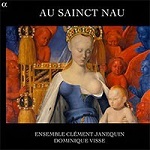
 Au
Sainct Nau (the title of a Poitevin carol – Nau = Noël
– here performed in a 1582 version: Disons Nau à pleine teste,
let us sing Noël with full voice) is an album of Renaissance French
Christmas music by Claude Goudimel, Clément Janequin, Eustache du
Caurroy, Guillaume Costeley, Jean MOUTON and Claudin de Sermisy
performed by Trio Musica Humana and Ensemble Clément Janequin/Dominique
Visse (ALPHA198). The material ranges from sacred vocal works
to bawdy parodies, so there’s plenty for all tastes.
Au
Sainct Nau (the title of a Poitevin carol – Nau = Noël
– here performed in a 1582 version: Disons Nau à pleine teste,
let us sing Noël with full voice) is an album of Renaissance French
Christmas music by Claude Goudimel, Clément Janequin, Eustache du
Caurroy, Guillaume Costeley, Jean MOUTON and Claudin de Sermisy
performed by Trio Musica Humana and Ensemble Clément Janequin/Dominique
Visse (ALPHA198). The material ranges from sacred vocal works
to bawdy parodies, so there’s plenty for all tastes.
It’s due for release on 17 November 2014, so I was able to hear only
the limited bit-rate 192 kb/s press preview from Outhere, but that’s
good enough to lead me to believe that the lossless download from eclassical.com
will sound fine when, as I expect, it appears there. There’s a most
informative pdf booklet with texts and translations.
Two recent recordings feature Masses by William BYRD (1543-1623):
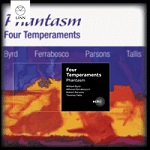 On
Four Temperaments the viol consort Phantasm, recorded
in 2004, perform the Four-part Mass with the sections interleaved
with music by Thomas TALLIS, Robert PARSONS and Alfonso FERRABOSCO.
Linn are in the process of reissuing recordings with new catalogue numbers,
in this case BKD487, while they remain at the same price. I’m
not sure why, or why the original covers have been defaced with a black
rectangle or square in the process, but it’s the quality of performance
and recording that counts which, in this case, is high on both counts.
On
Four Temperaments the viol consort Phantasm, recorded
in 2004, perform the Four-part Mass with the sections interleaved
with music by Thomas TALLIS, Robert PARSONS and Alfonso FERRABOSCO.
Linn are in the process of reissuing recordings with new catalogue numbers,
in this case BKD487, while they remain at the same price. I’m
not sure why, or why the original covers have been defaced with a black
rectangle or square in the process, but it’s the quality of performance
and recording that counts which, in this case, is high on both counts.
For this recording it’s more than a simple transfer from a CKD catalogue
number to one beginning with BKD: it first appeared on the Avie label
(AV2054) and you’ll find an appreciative and detailed review
from Johan van Veen. I shan’t want to hear the Byrd Mass in this way
every time, played by a viol consort, but the arrangement works very
well and integrates well with a most enjoyable programme.
Download from linnrecords.com
or hyperion-records.co.uk
(mp3 and 16-bit lossless). Both come with pdf booklet and both are
reasonably priced: £8 for mp3, £10 for 16-bit; from Linn also £13 for
CD.
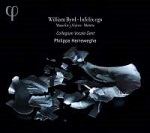 I
thought the recent Hyperion recording of all three Masses from Westminster
Cathedral Choir (CDA68038 – review
and 2014/11 – as good as any: an excellent set of performances which
stand out even in a very competitive field. A new recording from Collegium
Vocale Ghent and Philippe Herreweghe is always something to watch
out for even if, in this case, the repertoire is earlier in date than
his usual baroque and classical stamping ground. On PHI LPH014
(rec. August 2013) he performs BYRD's 5-part Mass with several
motets, including Infelix ego, which gives its name to
the album. Also included are motets by Alfonso FERRABOSCO and
Philippe de MONTE, whose Miserere mei rounds off the programme.
At 49:49 it’s on the short side but the eclassical.com
per-second charging policy takes care of that, making even the 24/96
version only $13.32: mp3 and 16-bit cost $8.88 and the pdf booklet with
text and translations is included.
I
thought the recent Hyperion recording of all three Masses from Westminster
Cathedral Choir (CDA68038 – review
and 2014/11 – as good as any: an excellent set of performances which
stand out even in a very competitive field. A new recording from Collegium
Vocale Ghent and Philippe Herreweghe is always something to watch
out for even if, in this case, the repertoire is earlier in date than
his usual baroque and classical stamping ground. On PHI LPH014
(rec. August 2013) he performs BYRD's 5-part Mass with several
motets, including Infelix ego, which gives its name to
the album. Also included are motets by Alfonso FERRABOSCO and
Philippe de MONTE, whose Miserere mei rounds off the programme.
At 49:49 it’s on the short side but the eclassical.com
per-second charging policy takes care of that, making even the 24/96
version only $13.32: mp3 and 16-bit cost $8.88 and the pdf booklet with
text and translations is included.
The attractions of having all three Byrd Masses on one CD are undeniable,
but if you are looking for a recording of the five-part setting alone
– perhaps if you have the Nimbus recordings of the three- and four-part
settings from Christ Church, Oxford – Herreweghe’s Byrd is as good as
his performances of the baroque repertoire.
My pre-release press download was at the low bit-rate of 192kbs. It
sounds well enough but is no match for the 24-bit Hyperion – note to
Outhere: please let reviewers have access to something better if we
are to pronounce on recording quality. The 24-bit version from eclassical.com,
however, runs the Hyperion very close for quality. The notes by Andrew
Carwood are excellent and the booklet contains texts and translations.
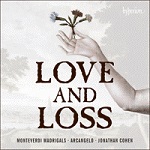 Claudio
MONTEVERDI (1567-1643) Madrigals of Love and Loss
Claudio
MONTEVERDI (1567-1643) Madrigals of Love and Loss
Please see my review
of the recent recording by Arcangelo directed by Jonathan Cohen on the
main MusicWeb International pages. (CDA68019 – from hyperion-records.co.uk,
mp3, 16- and 24-bit lossless, with pdf booklet of texts and notes).
Just for clarification: the Merula Ciaconna is used as an interlude
only in the first item, Volgendo il ciel: Movete al mio bel suon.
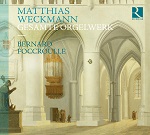
Update: Bernard Fouccroulle’s performances of the complete organ
works of Matthias WECKMANN (c.1616-1674) on Ricercar (RIC348)
which I reviewed in2014/13
are now available in mp3, 16- and 24-bit lossless from eclassical.com.
I enjoyed the music even in outhere.com’s 192 kb/s press preview but
even the 320 kb/s mp3 from eclassical.com is preferable and the 24-bit
is ideal for this kind of music, even if it’s a little pricey at $36.43.
(Mp3 and 16-bit come at a more reasonable $24.29.) The pdf booklet
is offered as part of the deal.
It’s now win/win if you are looking for Weckmann’s organ works; eclassical.com
also have the equally fine CPO release which I also reviewed in 2014/13.
Alessandro SCARLATTI (1660-1725)
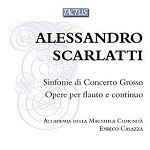
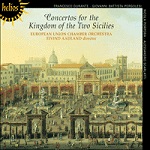 The
twelve oddly-named Sinfonie di Concerto Grosso are not very frequent
visitors to the catalogue, so the reissue of Enrico Cassazza’s 2-disc
set with the Accademia della Magnifica Comunità on the Tactus White
Label, with the Flute Concerto in A and Sinfonia in G (TB661990
[108:20]), first released in 2007 and recorded a few years earlier,
is welcome. Download with pdf booklet from eclassical.com
(mp3 and lossless). (NB: a slight glitch on track 32 has been
reported and should have been put right by the time that you read this.
If not, you will have the opportunity to download it again when it has
been.)
The
twelve oddly-named Sinfonie di Concerto Grosso are not very frequent
visitors to the catalogue, so the reissue of Enrico Cassazza’s 2-disc
set with the Accademia della Magnifica Comunità on the Tactus White
Label, with the Flute Concerto in A and Sinfonia in G (TB661990
[108:20]), first released in 2007 and recorded a few years earlier,
is welcome. Download with pdf booklet from eclassical.com
(mp3 and lossless). (NB: a slight glitch on track 32 has been
reported and should have been put right by the time that you read this.
If not, you will have the opportunity to download it again when it has
been.)
With dominant parts for his instrument, Paolo Caperci is the very effective
flautist and the performances all round are more stylish than the recordings
of six of these works by I Musici which were among the first-ever CD
releases from Philips; it’s time to shed that recording from my collection,
I think, as fine as William Bennett is on the flute (4000172: no longer
available, though one hopeful buyer is asking £18.58 for the reissued
version on the mid-price Insignia label).
If you are looking for just two concertos from this collection, Hyperion
offer the Sinfonia di concerto grosso No.12 in c minor and Concerto
No.6 in E on their budget Helios label, with music by Giovanni PERGOLESI,
Nicola PORPORA and Francesco DURANTE(Concertos
for the Kingdom of the Two Sicilies, CDH55005, European Union
Chamber Orchestra/Eivind Aadland – from hyperion-records.co.uk,
mp3 and lossless, with pdf booklet).
German Baroque Sacred Music: Christmas
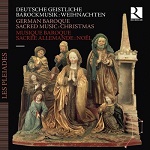
 This
is the second set of Les Pleiades, ‘the intelligent collection
of Ricercar reissues’: it contains 7 CDs focusing on German Baroque
religious repertoire for the Nativity, from the early 17th century to
Johann Sebastian BACH – represented here by a few very beautiful
Christmas cantatas – and his generation. Alongside Heinrich SCHÜTZ’s
Christmas Oratorio and lovely Christmas cantatas by Christoph
GRAUPNER – preferred candidate for the post at Leipzig, till they
had to ‘make do’ with Bach – the music ranges from the Annunciation
to the Presentation in the Temple (Candlemas), and includes the reconstruction
of a Lutheran Christmas service. The other composers include PRÆTORIUS,
SELLE, TENDER, LÜBECK, BUXTEHUDE, SCHEIDT, HAMMERSCMIDT, and
BRUHNS.
This
is the second set of Les Pleiades, ‘the intelligent collection
of Ricercar reissues’: it contains 7 CDs focusing on German Baroque
religious repertoire for the Nativity, from the early 17th century to
Johann Sebastian BACH – represented here by a few very beautiful
Christmas cantatas – and his generation. Alongside Heinrich SCHÜTZ’s
Christmas Oratorio and lovely Christmas cantatas by Christoph
GRAUPNER – preferred candidate for the post at Leipzig, till they
had to ‘make do’ with Bach – the music ranges from the Annunciation
to the Presentation in the Temple (Candlemas), and includes the reconstruction
of a Lutheran Christmas service. The other composers include PRÆTORIUS,
SELLE, TENDER, LÜBECK, BUXTEHUDE, SCHEIDT, HAMMERSCMIDT, and
BRUHNS.
The accomplished performers include: Greta De Reyghere, Agnès Mellon,
Claire Lefilliâtre, Amaryllis Dieltiens and Elisabeth Scholl (sopranos);
Henri Ledroit, Dominique Visse (counter-tenors); Guy De Mey, Ian Honeyman,
Hans-Jörg Mammel, Lothar Blum and Reinoud van Mechelen (tenors); Stefan
Geyer (baritone); Max van Egmond (bass); Bernard Foccroulle (organ);
Choeur de Chambre de Namur/Denis Menier; the Ricercar Consort; La Fenice/Jean
Tubéry; Capella Sancti Michaelis/Eric van Nevel; Collegium Vocale Gent/Philippe
Herreweghe; Philippe Pierlot; Les Agrémens/Jean Tubery; Mannheimer Hofkapelle;
Ex Tempore/Florian Heyerick. (Ricercar RIC349 [8:11:27] – from
classicsonline.com
(mp3) or stream from Naxos
Music Library, both with pdf booklet.)
I’ve enjoyed and reviewed some of the constituent parts of this bumper
reissue before so it’s very easy to recommend their reappearance at
a lower price, with two reservations: you may already have a good recording
of Schütz’s Christmas Story (see below) or some of the other
component works and the 100-page pdf booklet, though containing detailed
trilingual notes, doesn’t, unfortunately, contain the texts.
Another word of caution: the classicsonline.com UK download price of
£55.93 is not competitive – you should be able to find the 7-CD set
for £33 or $50 or less. 7digital.com
offer it for £23.99 (mp3) but listeners have reported a problem which
I can confirm: their zip files rarely work, so you have to download
one file at a time – very tedious – and then sort them into the right
order – even more onerous. Paradoxically, classicsonline.com have RIC221,
a 2-CD set which forms the first part of the reissue, for the price
of one, £7.99! A link from Naxos Music Library will also take you to
a lower-bit download from iTunes – also over-priced at $69.99. I’ve
mentioned the price anomaly to Naxos USA but have not yet received a
reply. I know that when I raise a similar issue with other suppliers
I’m told that the record companies dictate the price of the download.
Disc 3 of the collection contains Heinrich SCHÜTZ (1585-1672)
Christmas Story: Historia der Geburt Jesu Christi, SWV435, a
work of which we are not in short supply, with fine recordings from
Ars Nova and Paul Hillier (DaCapo), Gabrieli Consort/Paul McCreesh (DG,
download only) and, at budget price, Oxford Camerata/Jeremy Summerly
(Naxos), with the Harmonia Mundi Concerto Vocale/René Jacobs due to
join them on the budget-price D’Abord label in early December 2014.
Concerto – Venice: The Golden Age
Uri ROM (b.1969) Concerto ‘L’Olimpiade’ in C, Quasi-Pasticcio
after Antonio Vivaldi and Carlo Tessarini [14:47]
Antonio VIVALDI (1678-1741) Concerto in e minor, RV134 [5:42]
Alessandro MARCELLO (1673-1747) Concerto in d minor [9:28]
Giovanni PORTA (c.1675-1755) Sinfonia in D [4:28]
Antonio VIVALDI Concerto in B flat, RV364, RV Anh.18* [8:08]
Concerto ‘per Sua Altezza Reale di Sassonia’ in g minor, RV576 [9:52]
Carlo TESSARINI (1690-1766) Ove rture in D from Op.4 ‘La Stravaganza’
[6:02]
Antonio VIVALDI Concerto in C, RV450 [10:01]
Xenia Löffler (baroque oboe)
Akademie für Alte Musik Berlin/Georg Kallweit (violin)
rec. October 2013 and February 2014
pdf booklet included
HARMONIA MUNDI HMC902185 [68:28] – from eclassical.com
(mp3, 16- and 24-bit lossless) or stream from Naxos
Music Library
Venetian Oboe Concertos
Antonio VIVALDI (1678–1741) Concerto in do maggiore RV
449/178 (Op.8/12) [10:03]
Giovanni Benedetto PLATTI (1697–1763) Concerto in sol minore
[12:16]
Tomaso ALBINONI (1671–1751) Concerto si bemolle maggiore
Op.7/3 [7:11]
Alessandro MARCELLO (1673–1747) Concerto in re minore
[11:00]
Giuseppe SAMMARTINI (1695–1750) Concerto in re maggiore
[11:46]
Antonio VIVALDI Concerto in sol minore RV 460 (Op.11/6)
[10:43]
Diogenio BIGAGLIA (c.1676–c.1745) Concerto in si bemolle maggiore
(first recording) [8:25]
Alfredo Bernardini (Anciuti oboe, 1730); Zefiro
rec. February 2014. DDD
ARCANA A380 [71:30] – due for release 17 November 2014.
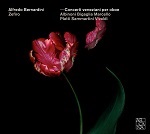
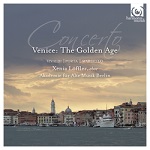 I
liked the recording of Telemann Overtures by Zefiro and Alfredo
Bernardini when I reviewed it in 2013/17
and their new recording of Albinoni and his contemporaries is equally
welcome. Even better news is that there is only one work which overlaps
between this and the equally fine new recording from Xenia Löffler
and the Akademie für alte Musik, the Marcello in re minore
(d minor).
I
liked the recording of Telemann Overtures by Zefiro and Alfredo
Bernardini when I reviewed it in 2013/17
and their new recording of Albinoni and his contemporaries is equally
welcome. Even better news is that there is only one work which overlaps
between this and the equally fine new recording from Xenia Löffler
and the Akademie für alte Musik, the Marcello in re minore
(d minor).
Both are excellent, so which to choose if you want only one? The Arcana
includes a concerto by Albinoni, the first begetter of the oboe concerto.
There is no Albinoni on the Harmonia Mundi but you may already have
his Op.9 concertos, some played on the violin, some on the oboe by Frank
de Bruine, with AAM/Christopher Hogwood in Part 2 of the super-budget
Decca Oiseau-Lyre Baroque Era set which I enthused over in 2014/10:
remember that it's a limited edition, so you should snap it up at once.
Bernardini also performs on a very special instrument, made by the maestro
Anciuti in 1730; he is acknowledged as one of the world's finest baroque
oboists, and his recording ends with a novelty, the first recording
of a concerto by Bigaglia.
There's a novelty on the Harmonia Mundi, too, a pastiche of music by
Vivaldi and Tessarini specially composed for Xenia Löffler by Uri
Rom, and the Porta concerto may also be a first-timer. The lack of Albinoni
here may easily be remedied, not only in the form of the Op.9 concertos
that I've mentioned: Chandos have some first-rate recordings of his
complete Op.7 and Op.9 from Collegium Musicum 90 on a 3-CD mid-price
set, CHAN0792 – download from theclassicalshop.net.
(Also available separately at full price on CHAN0579, 0602,
0610).
I listened to the Harmonia Mundi in 24-bit lossless sound but only to
a 192 kb/s press preview of the Arcana – hardly a fair comparison,
but good enough to predict that it will sound very well when it, too,
is available from eclassical.com in lossless sound, as I expect it to
be, perhaps by the time that you read this.
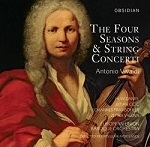 There
was no compelling need for a new recording of Antonio VIVALDI
The Four Seasons (Op.8/1-4) but a new version from the European
Union Baroque Orchestra (Obisian OBSID-CD713 [53:50] rec. June
2014 – from eclassical.com,
mp3, 16- and 24-bit lossless, with pdf booklet) has at least a raison
d'être in including a recitation of the sonnets that Vivaldi wrote
to accompany the music, one per season, in the original Italian. If
you miss the words, they are there in the booklet, with translation.
There
was no compelling need for a new recording of Antonio VIVALDI
The Four Seasons (Op.8/1-4) but a new version from the European
Union Baroque Orchestra (Obisian OBSID-CD713 [53:50] rec. June
2014 – from eclassical.com,
mp3, 16- and 24-bit lossless, with pdf booklet) has at least a raison
d'être in including a recitation of the sonnets that Vivaldi wrote
to accompany the music, one per season, in the original Italian. If
you miss the words, they are there in the booklet, with translation.
There are four different – and fine – violin soloists, one
per season, but the presence of the guiding hands of Lars Ulrik Mortensen
directing from the harpsichord adds greatly to the success of these
performances. By comparison with many recent interpretations, these
are fairly temperate seasons, but never lacking in interest. The barking
dog in the slow movement of Spring may be a little quiet compared
with my benchmark but that didn't prevent my enjoying this and the other
concertos, as well as the Concerto in D, RV124, with which proceedings
open – it's a pleasant surprise for once not to open with Spring.
The string concerto in g minor, RV157, rounds off the programme.
Short value but the eclassical.com per-second charging price compensates:
just $9.69 for mp3 and 16-bit, with 24-bit still modestly priced at
$14.54.
Recording of the Month
A Royal Trio
Attilio ARIOSTI (1666-1729) Overture from Vespasiano (1724)
[5:12]
George Frideric HANDEL (1685-1759) ‘Rompo i lacci’ from Flavio
(1723) [5:51]
Giovanni BONONCINI (1670-1747) ‘Così stanco Pellegrino’ from
Crispo (1721) [5:51]
George Frideric HANDEL Sinfonia from Admeto (1727) [1:29]
‘Va tacito’ from Giulio Cesare (1724) [7:01]
‘Io son tradito’ from Ottone (1723) [1:44]
‘Tanti affanni’ from Ottone [9:37]
Giovanni BONONCINI ‘Per la gloria d’adorarvi’ from Griselda
(1722) [3:38]
Attilio ARIOSTI ‘Freme l’onda’ from Il naufragio vicino
(1724) [3:49]
‘Spirate, o iniqui marmi’ from Coriolano (1723) [3:12]
‘Voi d’un figlio tanto misero’ from Coriolano [7:37]
Giovanni BONONCINI ‘Torrente che scende’ from Crispo
[4:11]
George Frideric HANDEL Introduzione (Ballo di Larve)
from Admeto [1:58]
‘Orride larve’ from Admeto [3:12]
‘Chiudetevi miei lumi’ from Admeto [3:22]
Giovanni BONONCINI ‘Tigre piagata’ from Muzio Scevola
(1721) [3:10]
George Frideric HANDEL Sinfonia from Admeto, act II,
i [1:21]
‘Vivi, tiranno’ from Rodelinda (1725) [5:52]
Lawrence Zazzo (counter-tenor)
La Nuova Musica/David Bates
rec. January 2014, St. John’s, Smith Square, London.
pdf booklet with texts and translations included
HARMONIA MUNDI HMU807590 [77:54] – from eclassical.com
(mp3, 16- and 24-bit lossless, no booklet) or stream from Naxos
Music Library
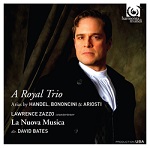 Bononcini
is reasonably well known as the tweedledum to Handel’s tweedledee:
Bononcini
is reasonably well known as the tweedledum to Handel’s tweedledee:
Some say, compar’d to Bononcini
That Mynheer Handel’s but a Ninny
Others aver, that he to Handel
Is scarcely fit to hold a Candle
Strange all this Difference should be
’Twixt Tweedle-dum and Tweedle-dee!
(John Byrom : final couplet attributed to Swift or Pope)
Ariosti is much less well known, but he too was Handel’s rival in London
in the early 1720s. So good are these over-shadowed rivals that you
might be hard pressed in a double-blind experiment to say which composer
had composed which aria, with only Va tacito from Giulio Cesare
really well known even among the Handel pieces.
An illuminating recital in many ways, then, and one which contains some
very fine performances. Even the mp3 is very good, with 16- and 24-bit
lossless progressively adding a little more to the desirability of the
whole. As I was closing this edition I noted that a certain publication
has also made it a Recording of the Month.
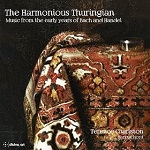 On
The Harmonious Thuringian (Divine Art DDA25122
[70:26]) Terence Charleston plays late 17th- and early
18 th-century music associated with the early years of Johann
Sebastian BACH and George Frideric HANDEL on a reconstruction
of a harpsichord of that period (c.1715: a’=440Hz, modified 1/5 comma
meantone temperament). Download from theclassicalshop.net
(mp3 and lossless: pdf booklet with detailed notes available). It’s
an instrument with a rich timbre and it’s played with style.
On
The Harmonious Thuringian (Divine Art DDA25122
[70:26]) Terence Charleston plays late 17th- and early
18 th-century music associated with the early years of Johann
Sebastian BACH and George Frideric HANDEL on a reconstruction
of a harpsichord of that period (c.1715: a’=440Hz, modified 1/5 comma
meantone temperament). Download from theclassicalshop.net
(mp3 and lossless: pdf booklet with detailed notes available). It’s
an instrument with a rich timbre and it’s played with style.
The programme opens with Bach: Toccata and Fugue in e minor, BWV914,
and ends with Handel: Suite No.5, HWV430, including the Air and Variations
known as ‘The Harmonious Blacksmith’. In the middle of this appetising
sandwich comes music by Fischer, Marchand, Krieger, more JSB – the Fantasia
in g minor, BWV917 – Ritter, J.C. Bach (1642-1703), Pachelbel (attrib.),
Merula, JSB’s Prelude in A, BWV896, Zachow and Kuhnau. Enlightening
and not just of academic interest in the extent to which both composers
were influenced by their precursors.
Jean-Philippe RAMEAU (1683-1764)
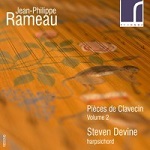 I
gave a warm welcome to Volume 1 of Steven Devine’s planned 4-volume
recordings of Rameau’s keyboard music (RES10131 – 2014/7)
and I see no reason not to extend the same courtesy to Volume 2 containing
the Nouvelles Suites in A/a minor and G/g minor (Resonus RES10140,
rec. April 2014 [66:44] – from resonusclassics.com,
aac, mp3, 16- and 24-bit lossless, or eclassical.com, mp3, 16- and 24-bit
lossless, both with pdf booklet). Unless you prefer this music as dressed
up in the Pièces de clavecin en concerts, these performances
strongly challenge existing recommendations. As before, Devine uses
a modern copy of a 1636 Rutgers 2-manual harpsichord with ravalement
by Henri Hemsch (1763).
I
gave a warm welcome to Volume 1 of Steven Devine’s planned 4-volume
recordings of Rameau’s keyboard music (RES10131 – 2014/7)
and I see no reason not to extend the same courtesy to Volume 2 containing
the Nouvelles Suites in A/a minor and G/g minor (Resonus RES10140,
rec. April 2014 [66:44] – from resonusclassics.com,
aac, mp3, 16- and 24-bit lossless, or eclassical.com, mp3, 16- and 24-bit
lossless, both with pdf booklet). Unless you prefer this music as dressed
up in the Pièces de clavecin en concerts, these performances
strongly challenge existing recommendations. As before, Devine uses
a modern copy of a 1636 Rutgers 2-manual harpsichord with ravalement
by Henri Hemsch (1763).
Though I normally think there is no contest between the harpsichord
and the modern piano in the music of this period, there are exceptions,
such as Angela Hewitt’s Bach. In this case Stephen Gutman’s series
of recordings of Rameau on the piano is such an exception and harpsichord-haters
will prefer it: Volume 3 features the suites in A/a and G/g: Toccata
TOCC0052: Recording of the Month – 2014/7.
Johann Sebastian BACH (1685-1750) Die Kunst der Fuge (The
Art of Fugue), BWV1080.
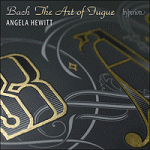 The
appearance of Angela Hewitt’s new recording of The Art of Fugue
on the piano (Hyperion CDA67980 [89:40], 2 CDs for the price
of one – from hyperion-records.co.uk,
mp3, 16- and 24-bit lossless, with pdf booklet) has prompted me to look
again at some of the available keyboard recordings. My benchmark recording
is on the organ from Helmut Walcha (DG Original Masters 4776508
– July
2009 DL Roundup* – or DG Collectors Edition E4637122, both
download only) or from Hans Fagius (organ, BIS-CD-1034 – from
eclassical.com,
mp3 and lossless, with pdf booklet), or André Isoir (organ, recently
reissued by La Dolce Volta LDV200). Davitt Moroney performs
the work on the harpsichord (Harmonia Mundi HMX2901169/70, download
only**). I’ll leave out for the moment recordings with viol consort
(Fretwork, Harmonia Mundi), and orchestral accounts such as Neville
Marriner’s with the ASMF (Double Decca, with Musical Offering).
The
appearance of Angela Hewitt’s new recording of The Art of Fugue
on the piano (Hyperion CDA67980 [89:40], 2 CDs for the price
of one – from hyperion-records.co.uk,
mp3, 16- and 24-bit lossless, with pdf booklet) has prompted me to look
again at some of the available keyboard recordings. My benchmark recording
is on the organ from Helmut Walcha (DG Original Masters 4776508
– July
2009 DL Roundup* – or DG Collectors Edition E4637122, both
download only) or from Hans Fagius (organ, BIS-CD-1034 – from
eclassical.com,
mp3 and lossless, with pdf booklet), or André Isoir (organ, recently
reissued by La Dolce Volta LDV200). Davitt Moroney performs
the work on the harpsichord (Harmonia Mundi HMX2901169/70, download
only**). I’ll leave out for the moment recordings with viol consort
(Fretwork, Harmonia Mundi), and orchestral accounts such as Neville
Marriner’s with the ASMF (Double Decca, with Musical Offering).
I haven’t included any other recordings on the piano for the simple
reason that I don’t generally think the modern instrument suited to
the performance of Bach. Though often wayward in the extreme, Glenn
Gould’s Bach recordings were for me the sole exception to that rule
until I encountered some of Angela Hewitt’s earlier Hyperion recordings.
Though my preference is for The Art of Fugue on the organ, the
obvious direct comparison is with Moroney, whose 2-CD set runs to 98:50,
being rounded off with a completion of Contrapunctus 14 by Moroney himself.
Hewitt leaves the music as Bach did and follows C.P.E. Bach’s example
by completing her recording, after a pause, with Vor deinen Thron
tret’ich hiermit, BWV688a. Harpsichord haters need have no hesitation
in going for the new Hyperion recording and I, too, am prepared again
to make an exception for Hewitt’s Bach – this is as good as those earlier
recordings which won me over.
* Ignore passionato.com link – no longer valid – download in mp3 from 7digital.com
or in mp3 or lossless from prestoclassical.co.uk
** from 7digital.com
(mp3) or eclassical.com
(mp3 and lossless)
*** from 7digital.com
(mp3) or eclassical.com
(mp3 and lossless)
Recording of the Month
Johann Sebastian BACH (1685-1750) Mass in b minor, BWV232
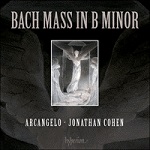
 To
the list of strongly competitive performances of this hotly contested
work we must now add a new recording from Arcangelo directed by Jonathan
Cohen. The soloists are Lydia Teuscher and Ida Falk Winland (soprano),
Tim Mead (counter-tenor), Samuel Boden (tenor) and Neal Davies (bass).
(Hyperion CDA68051/2 – rec October 2013 [114:40] – from hyperion-records.co.uk,
mp3, 16- and 24-bit lossless, with pdf booklet). Though I started to
listen with the intention of comparing the performance with benchmark
versions from John Eliot Gardiner (DG Archiv – see below) and John Butt
(Linn CKD354 – DL
Roundup July 2010), I soon became so absorbed in the quality of
the performance and recording – belying the rather sombre cover – that
all thoughts of recommending a ‘best buy’ went out of the window, so
I’ll simply content myself with saying that anything that challenges
Gardiner and Butt deserves to be a Recording of the Month.
To
the list of strongly competitive performances of this hotly contested
work we must now add a new recording from Arcangelo directed by Jonathan
Cohen. The soloists are Lydia Teuscher and Ida Falk Winland (soprano),
Tim Mead (counter-tenor), Samuel Boden (tenor) and Neal Davies (bass).
(Hyperion CDA68051/2 – rec October 2013 [114:40] – from hyperion-records.co.uk,
mp3, 16- and 24-bit lossless, with pdf booklet). Though I started to
listen with the intention of comparing the performance with benchmark
versions from John Eliot Gardiner (DG Archiv – see below) and John Butt
(Linn CKD354 – DL
Roundup July 2010), I soon became so absorbed in the quality of
the performance and recording – belying the rather sombre cover – that
all thoughts of recommending a ‘best buy’ went out of the window, so
I’ll simply content myself with saying that anything that challenges
Gardiner and Butt deserves to be a Recording of the Month.
This new recording will certainly be on my list when I want to listen
to the b-minor Mass in future, as will the Linn when I want to hear
a Rifkin-style one-voice-to-a-part performance. (Cohen has four voices
per part). I shall not, however, be jettisoning John Eliot Gardiner
any time soon. It’s hardly surprising that his recording obtained the
most votes in the MusicWeb International list of recommended recordings
– here
– and it’s now available at an attractive price on a DG twofer (4779984
, around £10). An even better bargain comes in the form of the 9-CD
set containing the b-minor Mass, the two Passions and the Christmas
Oratorio: authoritative performances from JEG of all the large-scale
Bach choral works for around £42 (4697692: download from 7digital.com * for £23.99). Bargain-lovers should also bear in mind
that every single extant note of Bach’s music is still available in
mp3 for around £165 on a 32GB USB from Warner Teldec (2564661127:
Recording of the Month – review).
I commend Richard Wigmore’s notes for the new Hyperion – available to
all comers from the Hyperion website – not just because they relieve
me of the necessity of going into the history and possible purpose of
the composition of this great work.
* a reminder that downloads from this source are best accessed by downloading
a track at a time and that you will then have to sort the tracks into
the right order – an onerous process for four long works. Other download
sites, however, may cost more or not offer the full 320 kb/s: if you
can’t be bothered with sorting the tracks from 7digital – I know that
one reader gave up – prestoclassical.co.uk
offer 320 kb/s mp3 for £26.96 and lossless for £33.71.
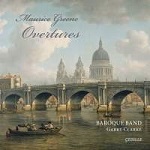 There
are recordings of the church and other vocal music and the instrumental
works of Maurice GREENE (1696-1755) but I don’t recall any previous
versions of his six Overtures in seven parts, coupled with the
overtures to Phoebe and to his Ode for St Cecilia’s Day.
The performers are the Baroque Band conducted by Garry Clarke, with
three pieces from his Collection of Lessons performed by David
Schrader (harpsichord) on Cedille CDR90000152 [62:49] – from
eclassical.com
(mp3, 16- and 24-bit lossless) or classicsonline.com
(mp3) or stream from Naxos
Music Library. There’s no booklet from any of these – just the back
cover.
There
are recordings of the church and other vocal music and the instrumental
works of Maurice GREENE (1696-1755) but I don’t recall any previous
versions of his six Overtures in seven parts, coupled with the
overtures to Phoebe and to his Ode for St Cecilia’s Day.
The performers are the Baroque Band conducted by Garry Clarke, with
three pieces from his Collection of Lessons performed by David
Schrader (harpsichord) on Cedille CDR90000152 [62:49] – from
eclassical.com
(mp3, 16- and 24-bit lossless) or classicsonline.com
(mp3) or stream from Naxos
Music Library. There’s no booklet from any of these – just the back
cover.
If you know the music of Greene’s contemporaries such as Arne, Boyce
– both featured on the baroque bargain of bargains, Baroque Era I
– 2014/10
– and Avison, you’ll know what to expect – music of no great depth but
very attractive and (very) enjoyable in these stylish performances.
The mp3 from classicsonline.com is very good, the lossless versions
from eclassical.com, especially the 24-bit, better still. I’m surprised
to see a link from Naxos Music Library not only to their own COL but
to iTunes – choose the former for full 320kb/s mp3 which, in my experience,
is not likely to be matched by ‘mastered for iTunes’ downloads.

 On
Johann Friedrich AGRICOLA (1720-1774) Three Christmas Cantatas
Michael Alexander Willens conducts a fine team of soloists and the Kölner
Aakademie in Uns ist ein Kind geboren (Unto us a child is born),
Die Hirten bey der Krippe (The shepherds at the crib) and Kündlich
groß ist das gottselige Geheimnis (Truly great is God’s holy mystery).
(CPO 7779212 – from eclassical.com,
mp3 and lossless, or stream from Naxos
Music Library, both with pdf booklet including texts and translations).
On
Johann Friedrich AGRICOLA (1720-1774) Three Christmas Cantatas
Michael Alexander Willens conducts a fine team of soloists and the Kölner
Aakademie in Uns ist ein Kind geboren (Unto us a child is born),
Die Hirten bey der Krippe (The shepherds at the crib) and Kündlich
groß ist das gottselige Geheimnis (Truly great is God’s holy mystery).
(CPO 7779212 – from eclassical.com,
mp3 and lossless, or stream from Naxos
Music Library, both with pdf booklet including texts and translations).
Agricola is not a composer whom I had come across before – the slightly
more famous Alexander Agricola preceded him by several centuries – but
on the basis of the recording this pupil and son-in-law of Bach deserves
to be better known. This is the only recording completely devoted to
his music, but Kündlich groß also features on a Carus recording
(83.442, with C.P.E. Bach, Graun, Zelter and Mendelssohn – review).
Wolfgang Amadeus MOZART (1756-1791)
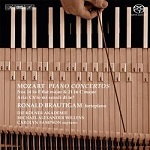 I
downloaded the latest release in the ongoing BIS series of the Piano
Concertos from Ronald Brautigam (fortepiano) and the Kölner
Akademie/Michael Alexander Willens some time ago and had my thoughts
ready to go online when it disappeared. Now it’s back again: Piano
Concertos No.21, K467 (the so-called Elvira Madigan) and
No.14, K449, on BIS-SACD-2054 [55:56] – from eclassical.com,
mp3, 16- and 24-bit lossless, with pdf booklet. Between the two concertos
Carolyn Sampson sings Ch’io mi scordi di te, K505.
I
downloaded the latest release in the ongoing BIS series of the Piano
Concertos from Ronald Brautigam (fortepiano) and the Kölner
Akademie/Michael Alexander Willens some time ago and had my thoughts
ready to go online when it disappeared. Now it’s back again: Piano
Concertos No.21, K467 (the so-called Elvira Madigan) and
No.14, K449, on BIS-SACD-2054 [55:56] – from eclassical.com,
mp3, 16- and 24-bit lossless, with pdf booklet. Between the two concertos
Carolyn Sampson sings Ch’io mi scordi di te, K505.
This will probably receive the same, to me, inexplicable opprobrium
in one quarter as the rest of the series has from a reviewer (not MusicWeb
International) who can’t understand why the rest of us like Brautigam’s
Mozart – period performance without tears, as I’ve described it, even
though I’m not particularly enamoured of the fortepiano per se.
You’ll probably know by now which of us you agree with but you should
be able to sample when it appears (soon?) on Naxos Music Library and
Qobuz.
Those who prefer the modern pianoforte have a vast choice from the 150
recordings of No.21: Stephen Kovacevich and Colin Davis (with No.25:
download, or on a special CD from presto-classical.co.uk),
Brendel and Marriner (with 19-20, 23-24 and Rondos, Decca Duo 4422692),
Mitsuko Uchida and Jeffrey Tate (with 19-20, 22-23: Decca Duo 4685402)
and the more recent Uchida recording with the Cleveland Orchestra (with
No.9: Decca 4783539) would be high on my list.
For No.14 Uchida and Tate (with Nos. 9, 15, 17 and Rondo K382: Decca
Duo 4733132) or Brendel and Janigro (with No.9 and Sonata No.8:
Alto ALC1047). If you prefer Mozart’s own chamber-scale arrangement,
Wallisch and the Piatti Quartet (with Nos. 12-13, Linn CKD424)
or McDermott and Calder Quartet (BRIDGE 9403).
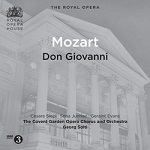 Sir
Georg Solti ’s live recording of Don Giovanni from
Covent Garden (1962) has been available before on the Opera d’Oro label
but its reissue by Opus Arte is very welcome. (OADA8009DI, [166:22]
– from eclassical.co.uk
(mp3 and lossless, with pdf booklet covering the whole series – no texts
and, apparently, no equivalent CDs). The cast is exceptionally strong,
including Geraint Evans, Mirella Freni, Cesare Siepi, Sena Jurinac and
Leyla Gencer.
Sir
Georg Solti ’s live recording of Don Giovanni from
Covent Garden (1962) has been available before on the Opera d’Oro label
but its reissue by Opus Arte is very welcome. (OADA8009DI, [166:22]
– from eclassical.co.uk
(mp3 and lossless, with pdf booklet covering the whole series – no texts
and, apparently, no equivalent CDs). The cast is exceptionally strong,
including Geraint Evans, Mirella Freni, Cesare Siepi, Sena Jurinac and
Leyla Gencer.
The BBC mono recording sounds a little ragged, with some distortion
in loud passages, even in lossless form – sample it from Naxos
Music Library – but you may well be prepared to overlook that for
the sake of the performance.
Bargain of the Month: Wolfgang Amadeus MOZART (1756-1791)
Ultimate Mozart from Corona Classic Collection offers
12 hours of music, mostly of complete works, though there are a few
single movements interspersed. Apart from the Requiem, this would
make a wonderful starter collection. The works include:
• Clarinet Concerto
• Oboe Concerto
• Piano Concertos Nos. 17, 18, 19, 21 and 25
• Symphonies Nos. 33, 36, 38, 40 and 41
• Serenade No.13 (Eine kleine Nachtmusik)
• Serenade in D (Serenata Notturna)
• Divertimento No.1
• Divertimentos, K316-K318 (‘Salzburg Symphonies)
• Piano Trio Nos. 2, 3, 5, 6
• Requiem
• Excerpts from Die Zauberflöte, Cosí fan tutte,
Don Giovanni, Le Nozze di Figaro
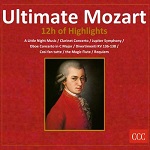
 The
performances emanate from Berlin Classics and are what would be best
described as good runners-up, such as the symphonies from Virtuosi Saxones
and Ludwig Güttler, but there are some distinguished performers among
them, including Kurt Masur, Herbert Blomstedt, Otmar Suitner, Theo Adam
and Helmut Koch. The Güttler 3-CD set of Symphonies and Divertimenti
alone (0013802BC) costs around £19, so the price for the 12-disc
set (£7.99 from
7digital.com, mp3, or £8.63 in lossless quality from Qobuz
is extremely generous.
The
performances emanate from Berlin Classics and are what would be best
described as good runners-up, such as the symphonies from Virtuosi Saxones
and Ludwig Güttler, but there are some distinguished performers among
them, including Kurt Masur, Herbert Blomstedt, Otmar Suitner, Theo Adam
and Helmut Koch. The Güttler 3-CD set of Symphonies and Divertimenti
alone (0013802BC) costs around £19, so the price for the 12-disc
set (£7.99 from
7digital.com, mp3, or £8.63 in lossless quality from Qobuz
is extremely generous.
Some of the performances date from a while ago – Annerose Schmidt’s
performance of Piano Concerto No.21, for example, was released on the
Philips mid-price Universo label in 1977, when the recording quality
was regarded as something of a handicap. Listening to the lossless version
streamed from Qobuz, the piano tone is still a little harsh but the
recording quality overall and the standard of performance are more than
acceptable.
On that LP the coupling was Eine kleine Nachtmusik and Serenata
Notturna, like the concerto with Otmar Suitner. EKN was lambasted
for unbelievably slow tempi but Berlin Classics have replaced it with
an altogether livelier performance directed by Max Pommer; if anything
the first movement is a bit too fast, but full marks for observing repeats.
You would expect to pay as much for a good recording of the Requiem
alone as for the whole set: indeed you’d pay £7.99 for mp3 or £9.58
for the lossless download of this recording (0185882BC)
from prestoclassical.co.uk.
I liked Theo Adam’s contribution but the other soloists are nowhere
near his quality. Some of the singing is really awful and the tempi
are mostly ponderous, so I wouldn’t rate this at all highly among performances
of the work: if you want Theo Adam, go for Peter Schreier’s recording
on Philips, with a first-rate team of soloists and the Coronation
Mass and Ave verum Corpus to boot (4647202). The Neville
Marriner recording, now on budget price Decca Virtuoso (4783360)
or as a download from ClassicFM full works – £4.99 from 7digital.com – will appeal to those who remember its use for the film
Amadeus.
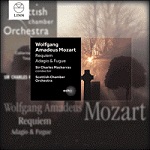 You’ll
find a review of four other desirable recordings of the Requiem,
from John Butt (Linn), Philippe Herreweghe (Harmonia Mundi), Christoph
Spering (Naïve) and Teodor Currentzis (Alpha) in 2014/4.
Any one of these would make an essential supplement to the Ultimate
Mozart. Those in search of Robert D. Levin’s edition, which seeks
to improve on the Süssmayr additions, should go for Sir Charles Mackerras’
recording on Linn BKD211 or CKD211, from
linnrecords.com (CD, mp3, 16- and 24-bit lossless) hyperion-records.co.uk
(mp3 or lossless), both with pdf booklet. It’s first rate, except that
I’m not sure why Linn have decided to reissue it at the same price and
spoil the cover with the black insert – they have done it to other recordings,
too.
You’ll
find a review of four other desirable recordings of the Requiem,
from John Butt (Linn), Philippe Herreweghe (Harmonia Mundi), Christoph
Spering (Naïve) and Teodor Currentzis (Alpha) in 2014/4.
Any one of these would make an essential supplement to the Ultimate
Mozart. Those in search of Robert D. Levin’s edition, which seeks
to improve on the Süssmayr additions, should go for Sir Charles Mackerras’
recording on Linn BKD211 or CKD211, from
linnrecords.com (CD, mp3, 16- and 24-bit lossless) hyperion-records.co.uk
(mp3 or lossless), both with pdf booklet. It’s first rate, except that
I’m not sure why Linn have decided to reissue it at the same price and
spoil the cover with the black insert – they have done it to other recordings,
too.
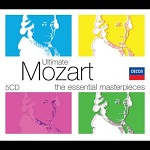 There
is also a 5-CD album with the same Ultimate Mozart title
on Universal Classics (4758052), with performances of Symphonies
Nos. 40 and 41 (COE/Solti), Piano Concertos Nos. 20 and 21 (Ashkenazy/Philharmonia),
Clarinet Concerto (Leister), Flute and Harp Concerto (Grafenauer and
Graf), Horn Concerto No.4 (Damm), Serenades and Divertimentos (all with
ASMF/Mariner) and Requiem (Price, Adam, etc; Staatskapelle/Schreier).
This would be a more secure recommendation but it casts its net less
widely and costs more (£10.99 from 7digital.com,
mp3; £13.88 from prestoclassical.co.uk,
lossless).
There
is also a 5-CD album with the same Ultimate Mozart title
on Universal Classics (4758052), with performances of Symphonies
Nos. 40 and 41 (COE/Solti), Piano Concertos Nos. 20 and 21 (Ashkenazy/Philharmonia),
Clarinet Concerto (Leister), Flute and Harp Concerto (Grafenauer and
Graf), Horn Concerto No.4 (Damm), Serenades and Divertimentos (all with
ASMF/Mariner) and Requiem (Price, Adam, etc; Staatskapelle/Schreier).
This would be a more secure recommendation but it casts its net less
widely and costs more (£10.99 from 7digital.com,
mp3; £13.88 from prestoclassical.co.uk,
lossless).
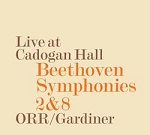 John
Eliot Gardiner has recorded BEETHOVEN’s Symphonies Nos.
2 and 8 live with the Orchestre Révolutionnaire et Romantique at
Cadogan Hall in November 2013 for his Soli Deo Gloria label (SDG721
[55:57] – from
classicsonline.com, mp3, or eclassical.com,
mp3, 16- and 24-bit lossless, both with pdf booklet). Stream from Naxos
Music Library.
John
Eliot Gardiner has recorded BEETHOVEN’s Symphonies Nos.
2 and 8 live with the Orchestre Révolutionnaire et Romantique at
Cadogan Hall in November 2013 for his Soli Deo Gloria label (SDG721
[55:57] – from
classicsonline.com, mp3, or eclassical.com,
mp3, 16- and 24-bit lossless, both with pdf booklet). Stream from Naxos
Music Library.
Don’t be put off by the very plain cover. John Quinn thought the earlier
release of Nos. 5 and 7, with an equally plain cover, excellent ( SDG717
– review).
That was recorded at New York’s Carnegie Hall; the new recording was
made at London’s Cadogan Hall. Of the new album he wrote: ‘These are
excellent performances, full of energy and interest ... One thing is
for sure: these performances are anything but dull’ – review.
Well worth considering as a supplement to a modern-instrument set, such
as Karajan’s (DG).
Gardiner’s highly-regarded earlier recordings of the Beethoven symphonies
for DG Archiv, also with the ORR, have now been gathered into a 5-CD
budget-price set (4778643); his recording of the Missa Solemnis
(DG Archiv 4297792) remains my benchmark for that work and his
new recording is not far behind at all (SDG718: Recording of the
Month – review).
Franz SCHUBERT (1797-1828) Schwanengesang , D957
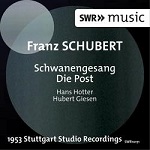 Hans
Hotter recorded Schwanengesang for UK Columbia – transposed down
to suit the baritone voice – with Gerald Moore c.1954 and that recording
remains available on Warner Masters 9937262 (2 CDs, with Winterreise,
etc., at lower mid-price). I hadn’t been aware that he also recorded
the work in 1953 with Hubert Giesen at the piano, but SWR records have
released that recording on SWR10171 – download from eclassical.com
(mp3 and lossless). Die Post (Winterreise) is included
as a filler. Though even the addition brings the album only to 53:41,
the eclassical.com per-second charging policy means a comparatively
reduced price of $9.66.
Hans
Hotter recorded Schwanengesang for UK Columbia – transposed down
to suit the baritone voice – with Gerald Moore c.1954 and that recording
remains available on Warner Masters 9937262 (2 CDs, with Winterreise,
etc., at lower mid-price). I hadn’t been aware that he also recorded
the work in 1953 with Hubert Giesen at the piano, but SWR records have
released that recording on SWR10171 – download from eclassical.com
(mp3 and lossless). Die Post (Winterreise) is included
as a filler. Though even the addition brings the album only to 53:41,
the eclassical.com per-second charging policy means a comparatively
reduced price of $9.66.
Though the recording with Gerald Moore seems to have developed iconic
status – three bracketed stars in the Penguin Guide – it was not well
received at the time by Alec Robertson, who thought that Hotter sounded
tired, dull and sepulchral in some of the songs. On SWR, too, the voice
is often unattractive and Giesen may be a competent accompanist but
he can’t compare with Gerald Moore. The recording is less kind to either
performer than the Warner and that now sounds dry.
I’ll stay with one of Dietrich Fischer-Dieskau’s recordings: his performances
for DG of Die schöne Müllerin, Die Winterreise and Schwanengesang
with Gerald Moore have just been reissued on a DG budget three-CD set
(4793074, around £15). If you want to hear Hans Hotter in better
voice in four of the Schwanengesang songs – there’s no harm in
detaching them: it wasn’t conceived as a cycle – try him with Geoffrey
Parsons in a Schubert and Wolf anthology: The Art of Hans Hotter
I (Decca 4808159).
I don’t know what documentation comes with the CD – which doesn’t seem
to have been released in the UK – but there’s none with the download.
Reissue of the Month
Johannes BRAHMS (1833-1891)
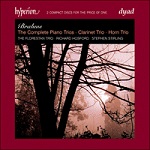
 The
Florestan Trio recording of the Piano Trios Nos. 1-3,
the Horn Trio (with Stephen Stirling) and the Clarinet Trio
(with Richard Hosford) was widely regarded as the best available even
at full price. Now it reappears as a 2-for-1 bargain on the Hyperion
Dyad label, which makes it even more desirable, capturing both the power
and the lyricism of these works. (CDD22082 [136:50] – from hyperion-records.co.uk,
mp3 and lossless, with pdf booklet). Apart from not being available
in 24-bit garb, the recordings are as fully competitive as the performances.
The
Florestan Trio recording of the Piano Trios Nos. 1-3,
the Horn Trio (with Stephen Stirling) and the Clarinet Trio
(with Richard Hosford) was widely regarded as the best available even
at full price. Now it reappears as a 2-for-1 bargain on the Hyperion
Dyad label, which makes it even more desirable, capturing both the power
and the lyricism of these works. (CDD22082 [136:50] – from hyperion-records.co.uk,
mp3 and lossless, with pdf booklet). Apart from not being available
in 24-bit garb, the recordings are as fully competitive as the performances.
The only rivals at this price are the Beaux Arts Trio in Nos.1-3 and
the posthumous Trio No.4 (Decca Originals, DDD, 4780338) or their
earlier ADD recording of the same works as on Hyperion (Decca Duo 4383652).
Antonín DVOŘÁK (1841-1904)
If, like me, you feel more than a little short-changed at having bought
Jiří Bělohlávek’s recent recording of the Cello Concerto
with Alisa Weilerstein only to discover a few months later that it’s
been incorporated into a complete set of the symphonies and concertos,
albeit at an attractive price (Decca 4786767), you may prefer
to look at some of his earlier recordings of the symphonies for Chandos
and Supraphon and the concertos for Harmonia Mundi, Supraphon and Naïve:
• Harmonia Mundi HMC901867 : Cello Concerto; Piano Trio
No.4 (Dumky), with Jean-Guihen Queyras (cello), The Prague Philharmonia,
rec.2005 [69:37] – from eclassical.com
(mp3 and lossless, no booklet). (Also available on SACD).
• HMC901833 : Violin Concerto; Piano Trio No.3,
with Isabelle Faust (violin), The Prague Philharmonia, rec.2003 [69:39]
– from eclassical.com
(mp3 and lossless, no booklet)
• Naïve V5327 : Piano Concerto, with Francesco Piemontesi
and BBCSO (+ SCHUMANN Piano Concerto) [70:29] – from eclassical.com
(mp3 and lossless, with pdf booklet). DL
News 2013/10 and review
• Chandos CHAN9475 : Symphony No.5; The
Noon Witch; Scherzo Capriccioso, with Czech Philharmonic,
rec. 1992 and 1994 [68:58] – from theclassicalshop.net
(mp3 and lossless, with pdf booklet).
• CHAN9170 : The Wood Dove; Symphony No.6,
with Czech Philharmonic, rec.1992 [62:11] – from theclassicalshop.net
(mp3 and lossless, with pdf booklet)
• CHAN9391 : Symphony No.7; Nocturne in b minor;
Vodník (the Water Goblin), with Czech Philharmonic, rec. 1992
and 1994 [68:46] – from theclassicalshop.net
(mp3 and lossless, with pdf booklet)
• CHAN9048 : Symphony No.8; The Golden Spinning
Wheel, rec. 1991 and 1992 [60:24] – from theclassicalshop.net
(mp3 and lossless, with pdf booklet)
• Supraphon SU36392 : Symphony No.9 (‘From the New
World’); Symphonic Variations; Carnival Overture, with Czech
Philharmonic Orchestra, rec. c.2001 [74:15] – from emusic.com
(mp3) or, without Symphonic Variations [51:20], for £4.95 from 7digital.com
(mp3)
• Supraphon: Cello Concerto, with Michaela Fukacová
(cello) and Prague Symphony Orchestra, rec. Panton, 1989 [41:48] – £2.97
from 7digital.com
(mp3) (donload only)
• Supraphon SU37742: Piano Concerto; Cello
Concerto, with Martin Kasík (piano, cond Jiří Kout);
Jiří Barta (cello) and Czech PO - review
All except the Supraphon recordings can be streamed from Naxos Music
Library.
All these are well worth considering, Symphonies Nos. 6 and 7 especially
so, though the competition in Nos. 8 and 9 is very hot – we’re almost
swamped with good recordings of the New World, including one
that I have missed heretofore:
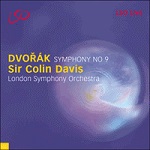
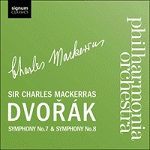 LSO
Live LSO0001 : LSO/Sir Colin Davis, rec.1999 [44:06] – from hyperion-records.co.uk
(mp3, 16- and 24-bit lossless, with pdf booklet). Only the short playing
time prevents a wholehearted welcome. The volume needs a boost. Still
with Czech music, there’s a review of Davis’ recording of Smetana’s
Má Vlast in 2014/11
(LSO0516).
LSO
Live LSO0001 : LSO/Sir Colin Davis, rec.1999 [44:06] – from hyperion-records.co.uk
(mp3, 16- and 24-bit lossless, with pdf booklet). Only the short playing
time prevents a wholehearted welcome. The volume needs a boost. Still
with Czech music, there’s a review of Davis’ recording of Smetana’s
Má Vlast in 2014/11
(LSO0516).
The bargain of bargains comes from Life with Czech Music, a 6-CD
set on which Sir Charles Mackerras conducts Symphonies Nos. 6, 8 and
9 and a wealth of other Dvorák music plus Smetana’s Má Vlast. (SU40412
- £7.99 from 7digital.com).
If you don’t mind an overlap with his Supraphon recordings, I mentioned
Sir Charles Mackerras’ Signum recording of Symphonies Nos. 7 and 8 with
the Philharmonia Orchestra (SIGCD183: RFH live, 2008) as sweeping
the board for this coupling in May
2012/1. I listed only the classicsonline.com mp3 and the now defunct
hmvdigital, but the album is now available in lossless sound for the
same price of £7.99 from hyperion-records.co.uk
and the pdf booklet comes as part of the deal.
Leoš JANÁČEK (1854-1928) Orchestral Works, Volume 1
Sinfonietta, JW VI/18 (1926) [23:20]
Capriccio for piano left hand, flute/piccolo, two trumpets, three trombones,
and tenor tuba, JW VII/12 (1926)* [20:08]
Suite from The Cunning Little Vixen, JW I/9 (1922–24; suite finally
revised, by Sir Charles Mackerras, 2008) [20:14]
Jean-Efflam Bavouzet (piano)*
Bergen Philharmonic Orchestra/Edward Gardner
rec. Grieghallen, Bergen, Norway; 10–12 March 2014. DDD/DSD
pdf booklet available
CHANDOS CHAN5142 [64:05] – from theclassicalshop.net
(mp3, 16- and 24-bit lossless)
(also available as SACD, CHSA5142 – see review
by John Quinn)
There’s such tough competition here that I could have chosen from a
plethora of alternatives – some listed at the end – but I’ll settle
for Sir Charles Mackerras with the Czech Philharmonic in the Sinfonietta
and Little Vixen Suite (Supraphon SU4022, 4 CDs, with
Glagolitic Mass – 2 versions – Taras Bulba and Overtures
and music by Martinu).
Mackerras drives the Sinfonietta hard and leaves you with the
impression that his is the only way to go; Gardner is a little less
hard-edged but convinces me that his is a viable alternative, as Ondrej
Lenard’s softer-edged version on Naxos fails to do. Indeed, by the
finale, there’s just as much power swirling around from Gardner as from
Mackerras. It’s unfair to compare Mackerras in mp3 with Gardner in
24/96 Studio Sound but the Chandos is superb in that format.
I must add a word of warning here: recent downloads from theclassicalshop.net
have not always gone smoothly and I know that at least one of my colleagues
has also experienced problems, with tracks not downloading properly
or completely. At the moment theclassicalshop.net is the only place
to obtain this recording in 24- or even 16-bit lossless but the mp3
is very good of its kind and that downloaded without any trouble. The
only way that I could listen to tracks 3 and 11 in 24-bit sound was
to ‘purchase’ them again – not an attractive option for the paying public.
The Capriccio for piano and chamber ensemble is less often recorded
but there’s a fine version from Rudolf Firkušny and members of the BPO,
together with a number of Janácek piano works on DG Originals E4497642
(2 CDs) and another on Chandos CHAN9399: Boris Berman with the
Netherlands Wind Ensemble (with Mlada, March of the Blue Boys
and Nursery Rhymes). It receives a fine performance on the new
Chandos album, with Jean-Efflam Bavouzet at least a match for Firkušny,
but even this strong advocacy didn’t persuade me that this is one of
Janácek’s best works.
The Cunning Little Vixen is, however, and the two-movement suite
here receives a charming performance that I shall be listening to again.
The bargain download of the Suites from The Cunning Little Vixen,
Osud and From the House of the Dead, the Czech Philharmonic
with František Jílek on Supraphon, which I reported on in July 2011/2 , is no longer available from emusic.com or anywhere else
that I can find.
The best way to hear The Cunning Little Vixen, however, is not
from the Suite – effectively an orchestral distillation of Act I – but
from Sir Charles Mackerras’ complete recording of the opera, with the
Suite as a bonus, on Decca Originals – from
7digital.com , mp3, for the very reasonable price of £7.49. I
must, however, warn you that the 31 tracks will download in completely
random order, with even the contents of the two CDs mixed up together:
two track 1s, etc., needing to be sorted. Though it’s offered at a
keen price and in full 320kb/s – albeit without booklet – I know that
several readers hate having to sort out the tracks in order. This recording
seems to be no longer available separately on CD, only in the nine-disc
set of all the operas, which costs around £40.
If you’re looking for a real bargain, a Double Decca combines the Sinfonietta
and Capriccio in performances by Sir Charles Mackerras with the
VPO and David Atherton with the London Sinfonietta (4482552,
with Taras Bulba, Lachian Dances, Suite for String
Orchestra, Mládi and Concertino – download for £7.49
from 7digital.com ). Also in the bargain category, Jirí Belohlávek’s recording
of the Sinfonietta, which I liked in its full-price incarnation
with Martinu Symphony No.6 (CHAN8897 – DL Roundup October
2010) has been reissued on a Chandos 2-for-1, with Little Vixen
Suite, Fiddler’s Child, Taras Bulba, Jealousy and
two works conducted by Gregory Rose, Idyll and Suite for String
Orchestra (CHAN241-7 – from theclassicalshop.net,
mp3 and lossless, with pdf booklet).
Béla BARTÓK (1881–1945) Divertimento,
Sz 113 (1939) [24:13]
Leoš JANÁČEK (1854–1928) Idyll
(1877) [24:02]
Suite (1878) [18:55]
Norwegian Chamber Orchestra/Iona Brown
rec. Eidsvoll Church, Norway; 18–20 November 1998
pdf booklet available
CHANDOS CHAN9816 [67:21] – from theclassicalshop.net
(mp3 16- and 24-bit lossless)
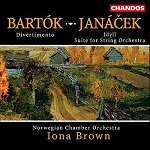 My
colleague David Barker has been killing two birds with one stone in
reviewing
this recording: reporting on back-catalogue material that we haven’t
covered before and exorcising some personal demons in the music of composers
with whom he has only recently begun to come to terms. In the process
he has also reminded me that this a recording that I had meant to get
round to.
My
colleague David Barker has been killing two birds with one stone in
reviewing
this recording: reporting on back-catalogue material that we haven’t
covered before and exorcising some personal demons in the music of composers
with whom he has only recently begun to come to terms. In the process
he has also reminded me that this a recording that I had meant to get
round to.
Unlike him, I’ve had a soft spot for the Divertimento and the
Idyll for some time. In the case of the Bartók that dates back
to a 1969 DG Heliodor recording from Herbert Kegel and the Leipzig Radio
Chamber Orchestra – a very acceptable performance coupled with something
of a turkey in Heinz Bongartz’s attempt at Hindemith Mathis der Maler
Symphony. Good as the Bartók half of that LP was, it was no match for
performance or recording quality of the Chandos and the price (14/6,
about the least expensive category then) would equate to around twice
what you would pay for the 16-bit version of the download (£9.99) and
even a good deal more than the 24-bit (£11.99)
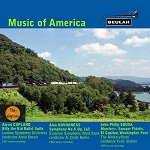 The
marches of John Philip SOUSA (1854-1932) are the embodiment of
the USA – his name even ends with those three letters – and Beulah have
done well by his music with reissues of the Eastman Rochester/Fennell
recordings. Now they add fine recordings by a Military Band directed
by Felix Slatkin of Semper Fidelis, El Capitan and Washington
Post. Also on 1PDR1 are Aaron COPLAND (1900-1990)
Billy the Kid Suite (LSO/Antal Doráti, Mercury 1961) and Alan
HOVHANESS (1911-2000) Symphony No.4, Op.165 (Eastman Symphonic Wind
Ensemble/A. Clyde Roller, Mercury 1962), all from stereo originals.
Download from iTunes.
The
marches of John Philip SOUSA (1854-1932) are the embodiment of
the USA – his name even ends with those three letters – and Beulah have
done well by his music with reissues of the Eastman Rochester/Fennell
recordings. Now they add fine recordings by a Military Band directed
by Felix Slatkin of Semper Fidelis, El Capitan and Washington
Post. Also on 1PDR1 are Aaron COPLAND (1900-1990)
Billy the Kid Suite (LSO/Antal Doráti, Mercury 1961) and Alan
HOVHANESS (1911-2000) Symphony No.4, Op.165 (Eastman Symphonic Wind
Ensemble/A. Clyde Roller, Mercury 1962), all from stereo originals.
Download from iTunes.
I hadn’t heard this idiomatic recording of Billy the Kid before
but I liked it very much and the recording has held up well in this
transfer. This recording of Hovhaness is something of a collector’s
item on LP, with prices of $50 and more being asked, so the Beulah transfer
– again very well managed – is extremely valuable.
Sir Edward ELGAR (1857-1934)
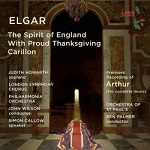 We
already had fine performances of The Spirit of England,
Op.80, but the work’s association with the First World War, closing
with a setting of Laurence Binyon’s For the Fallen, made it almost
inevitable that the centenary of the start of that war would bring at
least one more recording, this time from Somm (SOMMCD0255: LSO
Chorus; Philharmonia/John Wilson [70:12] – from
classicsonline.com (mp3) or stream from Naxos
Music Library, both with pdf booklet). It receives a powerful performance
but Judith Haworth’s soprano solo is too squally in places for my liking,
so I shall stay with the Gibson (Chandos CHAN6754 –
August 2012/1) and Lloyd-Jones (Dutton CDLX7172 –
review and 2014/8)
recordings.
We
already had fine performances of The Spirit of England,
Op.80, but the work’s association with the First World War, closing
with a setting of Laurence Binyon’s For the Fallen, made it almost
inevitable that the centenary of the start of that war would bring at
least one more recording, this time from Somm (SOMMCD0255: LSO
Chorus; Philharmonia/John Wilson [70:12] – from
classicsonline.com (mp3) or stream from Naxos
Music Library, both with pdf booklet). It receives a powerful performance
but Judith Haworth’s soprano solo is too squally in places for my liking,
so I shall stay with the Gibson (Chandos CHAN6754 –
August 2012/1) and Lloyd-Jones (Dutton CDLX7172 –
review and 2014/8)
recordings.
What is valuable, however, is the complete music of Arthur –
a premiere recording made by the Orchestra of St Pauls/Ben Palmer.
You may be prepared to tolerate the recording of The Spirit of England
for this and the other works. For a more positive view of this recording,
though still with reservations about Judith Haworth, please see review
and article
by John Quinn.
Claude DEBUSSY (1862-1918)
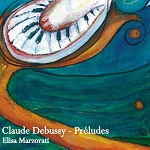 Last
month Geoffrey Molyneux sang the praises of the new Hyperion recording
of Debussy Images and Préludes Book II from Marc-André
Hamelin ( CDA67920). No sooner had I knocked that edition into
html than I received a new recording of the complete Préludes
from Elisa Marzorati, available from iTunes.
Last
month Geoffrey Molyneux sang the praises of the new Hyperion recording
of Debussy Images and Préludes Book II from Marc-André
Hamelin ( CDA67920). No sooner had I knocked that edition into
html than I received a new recording of the complete Préludes
from Elisa Marzorati, available from iTunes.
Don’t be confused by the iTunes presentation which suggests that she
begins the programmes with Feux d’artifice – perhaps they thought
that placing such a well-known piece first would attract the buyers.
She does, in fact, play the music in the published order, with Danseuses
de Delphes (I, 1) first. The clear benchmark for both books is
the classic Walter Gieseking recording. Though made as long ago as
1953/54 in mono and clearly no match for the new recording, in its latest
transfer that EMI Classics album still sounds remarkably well. Whereas
Ms. Marzorati stresses the languid, impressionist side of Debussy’s
music, Gieseking points the slightly different moods as the piece progresses.
Debussy’s music and Monet’s paintings are often compared – both come
under the general label ‘impressionist’ – and the comparison is apt
in that both offer an impression of a theme that can be slightly varied.
In Debussy’s case a piece like Le vent dans la pleine (I, 3)
can depict the ever-changing nature of the wind that blows as and when
it pleases, no two gusts ever quite the same. In Monet’s case he painted
his garden at Givenchy, the nearby stretch of the Seine and Rouen Cathedral
over and over again, in different light, at different times of the day
and in different seasons of the year. Marzorati gives us the energy
of the wind – Debussy’s animé marking – but perhaps not enough
of its variety as it might have been depicted in a series of Monet paintings.
Here, as in Danseuses de Delphes, she is a shade slower than
Gieseking and I think his tempo and greater variety have marginally
the advantage.
I’m judging the new recording by the most exalted standards which even
Steven Osborne (Hyperion CDA67530) can’t quite match. Heard
on its own without comparison it makes a strong impression – try Les
Collines d’Anacapri (I, 5, track 5) for example: here her time of
3:03 is perhaps more très moderé than Gieseking’s 2:47, without
missing any of the exuberance of the music. Osborne almost exactly
splits the difference at 2:59.
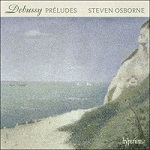 I
was surprised to discover that we don’t seem to have reviewed Steven
Osborne’s recording when it was released in 2006. His view of Danseuses
de Delphes is very similar to that of Marzorati: both recall the
tone of Monet’s hazier paintings of his favourite scenes – or the Seurats
which Hyperion use for their Debussy covers – without quite picking
out the highlights which Gieseking finds in the music. Both make a
very good showing in Voiles (I, 2), which does lend itself very
well to the hazier style, whereas, perhaps, Gieseking is a little too
fast.
I
was surprised to discover that we don’t seem to have reviewed Steven
Osborne’s recording when it was released in 2006. His view of Danseuses
de Delphes is very similar to that of Marzorati: both recall the
tone of Monet’s hazier paintings of his favourite scenes – or the Seurats
which Hyperion use for their Debussy covers – without quite picking
out the highlights which Gieseking finds in the music. Both make a
very good showing in Voiles (I, 2), which does lend itself very
well to the hazier style, whereas, perhaps, Gieseking is a little too
fast.
Book II ends with the fireworks of Feux d’artifice. Osborne
takes it rather sedately at 4:49, though there’s plenty of sparkle in
his playing. Marzori is a little slower still at 4:54 but also captures
the sparkle. Livia Rév, whose Hyperion recording is now available only
as a download or to order from the Archive Service is a bit faster at
4:21, but it’s Gieseking again who captures the animation without quite
overdoing it – if the others perhaps bear the first part of modéré
animé a little too much in mind, he certainly captures both parts
of the direction. The others, Marzorati included, certainly turn in
some nimble finger-work but Gieseking manages to be even more nimble
and yet make it all sound easy. Though I share Geoffrey Molyneux’s
appreciation of the new Hamelin recording, even he doesn’t quite achieve
that.
Geoffrey Molyneux has also been listening to these performances:
The first Prelude, Danseuses de Delphes is slow and elegiac in
mood. The performance ticks most of the boxes, but what happened to
Debussy’s expressive markings in bar 3, for example? I felt that some
passages, such as the sequences of chords seemed to be very static,
and that there was more room for imagination in the interpretation here.
Also I would have liked a more thorough-going legato in places.
Jean-Efflam Bavouzet on Chandos maintains a sense of forward propulsion
even at this very slow tempo. He gives us a beautifully expressive pianissimo
(very soft) at bar 11 at the beginning of the next section of the piece,
and further wonderful subtleties follow in some fabulous playing. In
Prelude No.4, Marzorati seems too fast and unvaried in tempo. The first
page was played nearly straight, barely touching on the expressive markings
given by the composer, let alone adding any kind of interpretive ideas.
When the composer writes En animant un peu, Elisa Marzorati concentrates
on un peu, so much so that the en animant is barely noticeable.
Further on, however, the crescendos are observed but the aggressive
fortes seem out of character. Just before the marked rubato
half way through, there is a slight drop-out in sound where a little
splicing may have taken place. Debussy asks for this piece to be played
harmonieux et souple and this is admirably achieved by Pascal
Rogé in his famous performance on Onyx, and he captures well the mood
and atmosphere needed.
I enjoyed Prelude No.5 rather more and for most of the time the music
dances along nicely, though sometimes the chordal passages sounded rather
laboured. No.6, Des pas sur la neige moves along nicely with
some gentle rubato. Prelude No.8, La fille aux cheveux de
lin is one of the most popular preludes in Book 1. Marzorati plays
this faster than most, and her way with it sounds rather matter-of-fact.
Walter Gieseking on EMI Classics realises Debussy’s request for très
calme beautifully, a feeling that eludes Marzorati. Bavouzet also
captures the mood perfectly here. La cathédrale engloutie, however,
is well played by Marzorati with rhythmic precision, and the performance
builds to a huge climax as it should. There is none of the pulse-changing
that we sometimes hear in this popular piece and this is effective.
I like the gentle conclusion which is very sensitively played.
Next comes La danse de Puck and this is played with real lightness
of touch. Minstrels concludes the first set of Preludes in a
performance of great clarity. I wondered whether the humour asked for
by Debussy would be better achieved if the pulse were not quite so rigid.
For example the en cedant marking at bar 35 seems to be ignored
but there is a touch of rubato in the expressif section
further on.
Book 2 begins with Brouillards which is played with delicacy
and finesse. The performance of La Puerta del Vino is charming,
demonstrating accuracy, with attention to dynamics and articulation,
but there seems to be almost no rubato, even in passages so marked
by the composer. Subtle adjustments in tempo can help to capture the
mood and feeling of the piece, especially for example in the section
marked passionnement. A little more slowing down would be effective
in those places where it is requested by the composer. The opening of
Bruyères is very expressively played, as is the whole piece.
I really enjoyed this and the ensuing prelude, General Lavine.
Ondine is characterfully played and the many contrasts of tempi,
mood and dynamic in Hommage a Pickwick Esq are superbly realised.
As we approach the conclusion of Book 2, the music becomes increasingly
virtuosic. The final Prelude, Feux d’artifice shows that Marzorati
is well able to cope with all the technical demands thrown at her by
Debussy, and the recording has real clarity at all dynamic levels.
The Debussy Preludes are very well played and professionally performed
by Elisa Marzorati and the recording is of good quality. On the whole
I preferred her interpretations of the preludes in Book 2, especially
later on when she often plays with flair and panache. However, I did
not feel that she offers anything new to say and I see no reason to
buy this recording when there are so many fine performances already
available. Walter Gieseking’s famous recording on EMI Classics is still
available and unmissable. On a par with this performance is the one
by Krystian Zimerman on DG, and there are many more fine recordings
available from such artists as Pascal Rogé, Jean-Efflam Bavouzet, and
Jean-Yves Thibaudet.
Geoffrey Molyneux
Ralph VAUGHAN WILLIAMS (1872-1958)
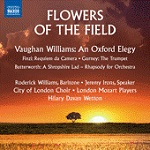 The
EMI recording of An Oxford Elegy from King’s College
Cambridge/David Willcocks, with John Westbrook as the ideal narrator
of the excerpts from Matthew Arnold’s A Scholar Gypsy and Thyrsis,
seems to be available now only in a 5-CD bundle (0954332) and
though it’s at super-budget price and in excellent company there with
classic recordings of Finzi and Holst, you may be looking for a single-CD
recording. There’s a Nimbus recording with Stephen Darlington and the
English String Orchestra (NI5166 – review)
but our two reviewers were slightly at odds over Jack May’s delivery
of Arnold’s words.
The
EMI recording of An Oxford Elegy from King’s College
Cambridge/David Willcocks, with John Westbrook as the ideal narrator
of the excerpts from Matthew Arnold’s A Scholar Gypsy and Thyrsis,
seems to be available now only in a 5-CD bundle (0954332) and
though it’s at super-budget price and in excellent company there with
classic recordings of Finzi and Holst, you may be looking for a single-CD
recording. There’s a Nimbus recording with Stephen Darlington and the
English String Orchestra (NI5166 – review)
but our two reviewers were slightly at odds over Jack May’s delivery
of Arnold’s words.
On a new Naxos recording entitled Flowers of the Field (8.573426
[60:37] – download from classicsonline.com,
mp3, or stream from Naxos
Music Library, both with pdf booklet) it’s performed by Jeremy Irons
(speaker), the City of London Choir and the London Mozart Players/Hilary
Davan Wetton with George Butterworth (A Shropshire Lad),
Gerald Finzi (Requiem da Camera) and Ivor Gurney
(The Trumpet). I have occasionally found Wetton’s performances
slightly understated and that’s the case with the Finzi – the quiet
beauty is there, but not always quite to the greatest effect compared
with the only current rival recording, from Richard Hickox on budget-price
Chandos (CHAN17083: Recording of the Month – review
and 2013/10).
The choral and orchestral contributions to the Oxford Elegy are
excellent – it’s not just the Arnold poetry or alumnus nostalgia that
makes this a splendid work – and Jeremy Irons makes a very fine contribution
to the success of this recording. He’s not quite a replacement for
Westbrook, though I think he has been listening to and learning from
that recording, achieving much the same compromise between detachment
and involvement, though I could wish at times that he had been recorded
more forwardly. The words are frequently so inaudible that I would
have had to read them from the booklet had I not known them so well,
so my heart remains with the older EMI. You can obtain it as a separate
download, but the 5-CD set is so inexpensive – on offer as I write from
one dealer for £10.03, otherwise around £16 – that I would go for that.
I love the Oxford Elegy – not all VW fans do – but I’ll stay
with Cambridge’s tribute to Oxford on EMI/Warner.
For Butterworth and Gurney, see also below under Alun Hoddinott.
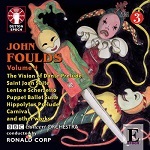 Volume
4 of Dutton’s recordings of the music of John FOULDS (1880-1939)
from BBC Concert Orchestra/Ronald Corp contains Carnival, The
Vision of Dante – Prelude, Hippolytus – Prelude, Op.84/1
(with Bethany Akers (oboe)), Saint Joan Suite, Puppet Ballet
Suite, Badinage, Grand Durbar March and Lento e Scherzetto
for cello and orchestra, Op.12 (with Benjamin Hughes (cello)). (CDLX7311
[71:42] – from 7digital.com,
mp3 and m4a, no booklet). Much of the music was never performed in
Foulds’ lifetime and there are no other recordings of any of it in the
UK catalogue, so this release is particularly welcome. It’s mostly
light in vein and responds well to the direction of Ronald Corp – himself
a distinguished composer of music in this vein. The disc has been reviewed
separately.
Volume
4 of Dutton’s recordings of the music of John FOULDS (1880-1939)
from BBC Concert Orchestra/Ronald Corp contains Carnival, The
Vision of Dante – Prelude, Hippolytus – Prelude, Op.84/1
(with Bethany Akers (oboe)), Saint Joan Suite, Puppet Ballet
Suite, Badinage, Grand Durbar March and Lento e Scherzetto
for cello and orchestra, Op.12 (with Benjamin Hughes (cello)). (CDLX7311
[71:42] – from 7digital.com,
mp3 and m4a, no booklet). Much of the music was never performed in
Foulds’ lifetime and there are no other recordings of any of it in the
UK catalogue, so this release is particularly welcome. It’s mostly
light in vein and responds well to the direction of Ronald Corp – himself
a distinguished composer of music in this vein. The disc has been reviewed
separately.
Can it actually be that 7digital have taken note of the readers’ concerns
which I raised with them concerning the order of tracks? Certainly
this album downloaded in the correct order and didn’t need to be sorted
out.
Sergey PROKOFIEV (1891-1953)
Symphony No.1 in D, ‘Classical’, Op.25 (1916-17)* [13:47]
Dreams , Op.6 (Symphonic Tableau) (1910) [9:26]
Symphony No.2 in d minor, Op.40 (1924-25) [33:46]
São Paulo Symphony Orchestra/Marin Alsop
rec. Sala São Paulo, Brazil, 29-31 August 2013 and *20-22 March 2014.
DDD/DSD
pdf booklet included
NAXOS 8.573353 [57:00] – from eclassical.com
(mp3, 16- and 24-bit lossless)
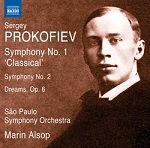 John
Quinn and Leslie Whitehouse have pronounced very favourably on this
in BD-A form – review
– so the first question is how well the 24-bit download, comparable
in theory with the stereo layer of the blu-ray, holds up.
John
Quinn and Leslie Whitehouse have pronounced very favourably on this
in BD-A form – review
– so the first question is how well the 24-bit download, comparable
in theory with the stereo layer of the blu-ray, holds up.
The download comes with a much plainer cover than the snazzy one for
the BD-A but the performance of the Classical Symphony is anything
but plain. The first movement is taken at a surprisingly slow pace
but that’s preferable to making it sound too hectic. Valery Gergiev’s
benchmark performance (Decca ex Philips) adopts a similar attitude to
Marin Alsop in terms of tempo here and throughout the work, except in
the finale where her slightly slower tempo pays off. I must admit to
being less charmed by this work, half a century and countless performances
later, than when I first heard it, but this version allowed me to hear
it in a new light and it may well become my recording of choice.
Dreams provides a peaceful, almost pastoral interlude before
we are launched into Symphony No.2. If the first is almost over-exposed,
the second is a comparative rarity and cast in a very different, brutalist
mode. Much as I love Prokofiev’s Symphonies 5-7, I can’t pretend that
I relate much to the three middle symphonies, Nos. 2-4; the composer
himself admitted that he didn’t understand the Second, but Alsop and
her team offer a performance more likely to win friends for it than
the old Turnabout LP (Jean Martinon) on which I first heard it (TV37056S:
still available on Vox CDX5054, 2 budget-price CDs).
The BD-A version sells for around £11.50, the eclassical.com download
for $15.36 which, at current rates, is slightly less expensive. I haven’t
heard the BD-A but I listened first in very decent-sounding mp3, then
in 24/96 and the gain is noticeable – you need a volume boost to appreciate
it – and worth paying the extra for. If you try this album from Naxos
Music Library and decide that the Second is not for you, it’s possible
to buy the Classical Symphony and Dreams separately ($4.11
and $2.55 respectively in 24-bit.)
As it happens, Onyx have just released a rival recording of Nos.1 and
2 and Sinfonietta, with Kirill Karabits directing the Bournemouth
Symphony Orchestra (ONYX3139 [79:18] – from eclassical.com,
mp3 and lossless: no booklet and no 24-bit equivalent). Stream, with
booklet, from Naxos
Music Library. First impressions are favourable but I hope to include
a more detailed comparison in 2014/15.
The Chandos recording of Symphony No.2, with Romeo and Juliet
Suite No.1 (CHAN8368: RSNO/Neeme Järvi) is available only
from the Archive Service or as a download from theclassicalshop.net
(mp3 and lossless, with pdf booklet). The Complete Symphonies set,
CHAN10500, remains available on four CDs or as a download from theclassicalshop.net
(mp3 and lossless each at £19.98).
Carl ORFF (1895-1982)
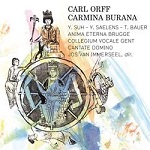 I
expected a new live recording (February 2014) of Carmina Burana
from Jos van Immerseel and his period-instrument Anima Eterna
Orchestra, Collegium Vocale Gent and Cantate Domino (Zig Zag Territoires
ZZT353 [64:20]) to be revelatory, perhaps in the same way as
the recent period-instrument Rite of Spring and Petrushka
(Roth, 2014/9).
My first impressions, listening to the low bit-rate mp3 press preview
from outhere-music.com (192kb/s), were disappointing: the music sounded
too low-charged, even anaemic. As soon as it appeared from eclassical.com
(mp3, 16- and 24-bit lossless, with pdf booklet), I listened to the
mp3 while the 24-bit was downloading and formed a better opinion, no
doubt because of the better quality (320kb/s), though I still felt that
the quieter passages came off better than the more dramatic, though
the opening and closing O Fortuna are more than powerful enough.
I
expected a new live recording (February 2014) of Carmina Burana
from Jos van Immerseel and his period-instrument Anima Eterna
Orchestra, Collegium Vocale Gent and Cantate Domino (Zig Zag Territoires
ZZT353 [64:20]) to be revelatory, perhaps in the same way as
the recent period-instrument Rite of Spring and Petrushka
(Roth, 2014/9).
My first impressions, listening to the low bit-rate mp3 press preview
from outhere-music.com (192kb/s), were disappointing: the music sounded
too low-charged, even anaemic. As soon as it appeared from eclassical.com
(mp3, 16- and 24-bit lossless, with pdf booklet), I listened to the
mp3 while the 24-bit was downloading and formed a better opinion, no
doubt because of the better quality (320kb/s), though I still felt that
the quieter passages came off better than the more dramatic, though
the opening and closing O Fortuna are more than powerful enough.
Music of this power requires the best recording, though that’s not to
decry earlier recordings from Eugen Jochum (DG Originals 4474372
– August
2010: ignore defunct passionato link. Only amazon.co.uk , at £6.99, charge less for the download than for the
CD), André Previn (Warner/EMI 6787042) or Rafael Frühbeck de
Burgos (EMI – imprisoned in a 16-CD set or download 320kb/s mp3 for
£2.99 from sainsburysentertainment.co.uk ). For other recordings, please see
2014/7.
Good as these older recordings are, none of them approaches the quality
of 24/96 digital. While 320kb/s is clearly better than 192 kb/s, 24/96
flac really brings out both the power and the sensitivity of the Zig-Zag
recording and, at $17.37, it won’t cost an arm and a leg more than the
mp3 and 16-bit (both $11.58). Even so, it’s still my feeling that the
Immerseel sounds under-nourished, even after hearing the 24-bit. I
have the same reaction to Simon Rattle’s well-regarded recording with
modern instruments (EMI/Warner), so it’s not just the 1930s-style playing
that put me off. This work needs to sound brash.
For a much more positive response to this recording, please see Dan
Morgan’s Recording of the Month review.
Dan downloaded in 24/96 from Qobuz: at present exchange rates that works
out slightly more expensive than the equivalent from eclassical.com.
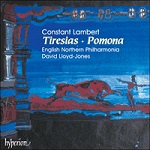 When
Constant LAMBERT (1903-1951) receives the attention which should
be his due, his ballets Pomona (1927) and Tiresias (1951),
one from the young composer, the other from his last year, may become
better known. There are three recordings of the one-act Pomona,
on Chandos, Lyrita and Hyperion and the last of these, with the English
Northern Philharmonia/David Lloyd-Jones, has fallen on hard times (CDA67049
– rec. 1998 [73:38]). This is one of only two recordings
of Tiresias, composed by the seriously ill composer for the Festival
of Britain. The recording is currently on offer at reduced price, an
incentive that probably won’t still be available when you read this,
but that should not stop you from
When
Constant LAMBERT (1903-1951) receives the attention which should
be his due, his ballets Pomona (1927) and Tiresias (1951),
one from the young composer, the other from his last year, may become
better known. There are three recordings of the one-act Pomona,
on Chandos, Lyrita and Hyperion and the last of these, with the English
Northern Philharmonia/David Lloyd-Jones, has fallen on hard times (CDA67049
– rec. 1998 [73:38]). This is one of only two recordings
of Tiresias, composed by the seriously ill composer for the Festival
of Britain. The recording is currently on offer at reduced price, an
incentive that probably won’t still be available when you read this,
but that should not stop you from 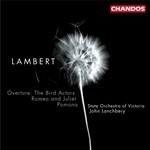 investigating
some fine music, very well performed and recorded – fromhyperion-records.co.uk
(mp3 and lossless, with pdf booklet). Rob Barnett –
review – and Gerald Fenech – review
– both awarded five well-deserved stars to the CD.
investigating
some fine music, very well performed and recorded – fromhyperion-records.co.uk
(mp3 and lossless, with pdf booklet). Rob Barnett –
review – and Gerald Fenech – review
– both awarded five well-deserved stars to the CD.
Recordings of Pomona seem to be very unfortunate: the Chandos,
too, is available on CD only from their archive service, but the download
remains available from theclassicalshop.net
in mp3, 16- and 24-bit lossless. The pdf booklet is available to all
comers. The coupling is the ballet which Lambert composed for Diaghilev
as Adam and Eve but which became Romeo and Juliet and
the performers are the State Orchestra of Victoria and that arch ballet
conductor and arranger, John Lanchbery. (CHAN9865, released
in 2000 [54:46]). This may have earned ‘only’ a 4-star review,
but it, too, is well worth considering.
Neither of these would be my entry point for Lambert’s music, however:
try budget-price Hyperion Helios CDH55388 – Rio Grande
and Summer’s Last Will and Testament – review
and 2011/1.
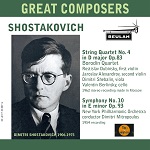 A
recording of music by Dmitri SHOSTAKOVICH (1906-1976), due to
be released by Beulah from their Korean
outlet (7BX190K), hadn’t yet appeared at the time of writing
but it is listed on the UK
webpage as a Korean release and should appear imminently on the
Korean site. It contains recordings of String Quartet No.4, Op.83 (a
benchmark recording from the Borodin Quartet, 1962, stereo) and Symphony
No.10 in e minor, Op.93 – NYPO/Dmitri Mitropoulos (a classic version
from 1954, recorded just days after the Western premiere of the work).
A
recording of music by Dmitri SHOSTAKOVICH (1906-1976), due to
be released by Beulah from their Korean
outlet (7BX190K), hadn’t yet appeared at the time of writing
but it is listed on the UK
webpage as a Korean release and should appear imminently on the
Korean site. It contains recordings of String Quartet No.4, Op.83 (a
benchmark recording from the Borodin Quartet, 1962, stereo) and Symphony
No.10 in e minor, Op.93 – NYPO/Dmitri Mitropoulos (a classic version
from 1954, recorded just days after the Western premiere of the work).
The transfer of the Borodin Quartet is rather bright but otherwise very
good. The Mitropoulos Tenth Symphony naturally requires a degree more
tolerance but it sounds better than I recall from its reissue on a mid-price
CBS LP and the performance – no longer available on CD, if it ever was
– is still well worth hearing. I think UK listeners would appreciate
access to this release, too.
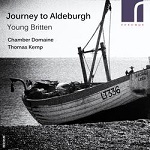 Journey
to Aldeburgh contains early chamber works by Benjamin BRITTEN
(1913-1976). There is a willow for 12 instruments – an arrangement
of his teacher Frank Bridge’s setting – Introduction and allegro
for Piano Trio, The Moon for violin and piano and Allegro
for piano are all receiving first recordings. The programme is completed
with the Suite for violin and piano, Op.6, and the Sinfonietta,
Op.1, in its original version. The performers are members of Chamber
Domaine, directed by Thomas Kemp (violin). (Resonus RES10139
[62:42] – from resonusclassics.com,
mp3, aac, 16- and 24-bit flac; pdf booklet available).
Journey
to Aldeburgh contains early chamber works by Benjamin BRITTEN
(1913-1976). There is a willow for 12 instruments – an arrangement
of his teacher Frank Bridge’s setting – Introduction and allegro
for Piano Trio, The Moon for violin and piano and Allegro
for piano are all receiving first recordings. The programme is completed
with the Suite for violin and piano, Op.6, and the Sinfonietta,
Op.1, in its original version. The performers are members of Chamber
Domaine, directed by Thomas Kemp (violin). (Resonus RES10139
[62:42] – from resonusclassics.com,
mp3, aac, 16- and 24-bit flac; pdf booklet available).
Like Britten to America (NMC NMCD190 – 2013/16),
this recording very usefully fills some gaps in the Britten discography,
albeit from a rather earlier period. With excellent performances and
recording, this is a slightly belated but welcome addition to the Britten
centenary celebrations.
The BBC SO and Edward Gardner inevitably make orchestral version of
the Sinfonietta sound a more substantial work (Chandos CHAN10671
– May
2011/2). That apart, Chamber Domaine are as persuasive as I recall
the Vienna Octet (Decca Eloquence).
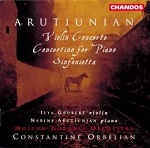 Pursuing
back-catalogue recordings which we didn’t review at the time, my colleague
David Barker tried music by Alexander ARUTIUNIAN (1920-2012)
– his Violin Concerto, Sinfonietta and Piano Concertino (Chandos CHAN9566
[52:36] – from theclassicalshop.net,
mp3 and lossless, pdf booklet available). Ilya Grubert (violin), Narine
Arutiunian (piano), Moscow Chamber Orchestra and Constantine Orbelian
give what I take to be authoritative performances of music which, though
pleasant enough, never seems to ‘go’ anywhere. I know that is a subjective
judgement – my wife says it of Balakirev’s Symphony No.1, music which
I adore, especially as directed by Beecham – but in this case David
and I are of one mind.
Pursuing
back-catalogue recordings which we didn’t review at the time, my colleague
David Barker tried music by Alexander ARUTIUNIAN (1920-2012)
– his Violin Concerto, Sinfonietta and Piano Concertino (Chandos CHAN9566
[52:36] – from theclassicalshop.net,
mp3 and lossless, pdf booklet available). Ilya Grubert (violin), Narine
Arutiunian (piano), Moscow Chamber Orchestra and Constantine Orbelian
give what I take to be authoritative performances of music which, though
pleasant enough, never seems to ‘go’ anywhere. I know that is a subjective
judgement – my wife says it of Balakirev’s Symphony No.1, music which
I adore, especially as directed by Beecham – but in this case David
and I are of one mind.
I had some difficulty downloading some of the tracks from theclassicalshop.net,
the ‘home’ of Chandos recordings, but none in downloading from eclassical.com,
where the price of $9.41 for mp3 and lossless is attractive, especially
for lossless. There’s no booklet there but it’s available to all comers
from theclassicalshop.net. You may wish to sample from Naxos
Music Library if you can.
Alun HODDINOTT (1929-2008)
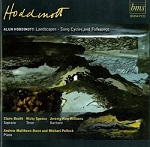 Though
I can appreciate that Alun Hoddinott’s song cycles stand firmly in the
tradition of British song, I haven’t yet come to love them like, say,
Ralph Vaughan Williams’ On Wenlock Edge or Ivor Gurney’s Ludlow
and Teme.* Landscapes and other works on British Music Society
BMS437CD (Claire Booth (soprano), Nicky Spence (tenor), Jeremy
Huw Williams (baritone)/Andrew Matthews-Owen, Michael Pollock (piano))
has gone some way to converting me – I’m sure that this album presents
the strongest possible advocacy – and has persuaded me to continue making
the effort, but I’m not there yet. If you think you might be in the
same boat, try if you can from
Naxos Music Library. Download from eclassical.com
(mp3 and lossless, with pdf booklet).
Though
I can appreciate that Alun Hoddinott’s song cycles stand firmly in the
tradition of British song, I haven’t yet come to love them like, say,
Ralph Vaughan Williams’ On Wenlock Edge or Ivor Gurney’s Ludlow
and Teme.* Landscapes and other works on British Music Society
BMS437CD (Claire Booth (soprano), Nicky Spence (tenor), Jeremy
Huw Williams (baritone)/Andrew Matthews-Owen, Michael Pollock (piano))
has gone some way to converting me – I’m sure that this album presents
the strongest possible advocacy – and has persuaded me to continue making
the effort, but I’m not there yet. If you think you might be in the
same boat, try if you can from
Naxos Music Library. Download from eclassical.com
(mp3 and lossless, with pdf booklet).
We have four reviews of the parent CD – here
– here
– here
and here
– each of which contains a button to purchase at an attractive price
from MusicWeb International if you prefer not to download.
* both available on Hyperion Helios CDH55187 – Adrian Thompson
(tenor), Stephen Varcoe (baritone) and Ian Burnside (piano), at budget
price, with Gurney’s The Western Playland: download from hyperion-records.co.uk
in mp3 and lossless, with pdf booklet – review
– or on Linn CKD296, with Warlock The Curlew, or on Signum
SIGCD112, with Ian Venables’ Songs of Eternity and Sorrow
– November
2010. Ignore the passionato.com link for the Signum: it’s available
in mp3 from amazon.co.uk .
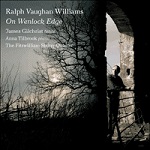 Having
only alluded briefly, albeit with approval, to CKD296 in the
past without further comment, I listened to it with much greater enjoyment
immediately after the Hoddinott. James Gilchrist (tenor) is accompanied
by the Fitzwilliam String Quartet and Anna Tilbrook (piano) inOn
Wenlock Edge and Ludlow and Teme and the third work is Peter
Warlock’s The Curlew. An excellent alternative to the Signum
– from
linnrecords.com (SACD, mp3, 16- and 24-bit lossless) or hyperion-records.co.uk
(mp3 and lossless) both with pdf booklet including texts.
Having
only alluded briefly, albeit with approval, to CKD296 in the
past without further comment, I listened to it with much greater enjoyment
immediately after the Hoddinott. James Gilchrist (tenor) is accompanied
by the Fitzwilliam String Quartet and Anna Tilbrook (piano) inOn
Wenlock Edge and Ludlow and Teme and the third work is Peter
Warlock’s The Curlew. An excellent alternative to the Signum
– from
linnrecords.com (SACD, mp3, 16- and 24-bit lossless) or hyperion-records.co.uk
(mp3 and lossless) both with pdf booklet including texts.
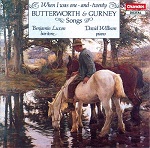 Remaining
with Housman-based music and Ivor Gurney, George Butterworth’s Six Songs
from A Shropshire Lad, Bredon Hill and other songs, together
with songs by Gurney are performed by Benjamin Luxon (baritone) and
David Willison (piano) on Chandos CHAN8831, recorded at Snape
Maltings in 1989. Butterworth’s settings are less impassioned than
those of Vaughan Williams and Gurney – more pastoral in feel – but well
worth hearing in such fine performances. Download from theclassicalshop.net
(mp3 and lossless; pdf booklet with texts available).
Remaining
with Housman-based music and Ivor Gurney, George Butterworth’s Six Songs
from A Shropshire Lad, Bredon Hill and other songs, together
with songs by Gurney are performed by Benjamin Luxon (baritone) and
David Willison (piano) on Chandos CHAN8831, recorded at Snape
Maltings in 1989. Butterworth’s settings are less impassioned than
those of Vaughan Williams and Gurney – more pastoral in feel – but well
worth hearing in such fine performances. Download from theclassicalshop.net
(mp3 and lossless; pdf booklet with texts available).
Butterworth (A Shropshire Lad – the orchestral work) and Gurney
– both victims of World War I, Butterworth killed in 1916 and Gurney
hospitalised for the rest of his life – are also united on a Naxos recording
Flowers of the Field. (See Vaughan Williams, above).
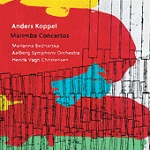
If the prospect of concertos for marimba and orchestra sounds alluring,
the Danish composer Anders KOPPEL (b.1947) has written four,
performed on DaCapo by Polish percussionist Marianna Bednarska and the
Aalborg Symphony Orchestra/Henrik Vagn Christensen (6.220595
[78:53]).
The somewhat angular nature of the music makes the reality a little
less exotic than the prospect, so I suggest sampling in advance from
Naxos
Music Library, where you can also read the booklet. If you like
what you hear, download from classicsonline.com
(mp3, with pdf booklet) or eclassical.com
(mp3, 16- and 24-bit lossless, with pdf booklet). If you need only
mp3, classicsonline.com works out slightly less expensive for UK purchasers
at current exchange rates.
Jazz Bargain of the Month
The Real Benny Goodman: The Ultimate Benny Goodman Collection
Contents include: Mission to Moscow; Body and Soul; After you’ve gone;
The Man I Love; I Got Rhythm; Honeysuckle Rose (live); Bugle Call Rag;
Get Happy; How Deep is the Ocean? Taking a Chance on Love; Bewitched;
Amapola; I’m Nobody’s Baby; Goody Goody; Can’t Teach My Old Heart New
Tricks; My Gal Sal; Stealin’ Apples
Peggy Lee, Helen Ward (vocals); Charlie Christian (guitar); Benny Goodman
and his Orchestra, Benny Goodman Trio, Benny Goodman Sextet
SONY COLUMBIA LEGACY 88725496372 [3:48:52] - from
sainsburysentertainment.co.uk (mp3)
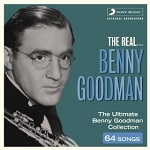
 Some
time ago I was more than a little disappointed by a Benny Goodman CD
from the Sounds of Yesteryear collection in that much
of the (radio) programme was taken up by dated humour from Victor Borge,
not then risen to full form (DSOY895 – review).
There are no such problems with this wonderful 3-CD set, taken from
Columbia (CBS) originals, many of them live, with intrusive applause.
Moreover, it’s a real bargain at £3.99 from
sainsburysentertainment.co.uk in 320 kb/s mp3 and with Nectar points
for UK purchasers if you’re signed up: don’t pay more for downloads
at lower bit-rates from other providers, especially when you can find
the 3-CD set for just over £4.
Some
time ago I was more than a little disappointed by a Benny Goodman CD
from the Sounds of Yesteryear collection in that much
of the (radio) programme was taken up by dated humour from Victor Borge,
not then risen to full form (DSOY895 – review).
There are no such problems with this wonderful 3-CD set, taken from
Columbia (CBS) originals, many of them live, with intrusive applause.
Moreover, it’s a real bargain at £3.99 from
sainsburysentertainment.co.uk in 320 kb/s mp3 and with Nectar points
for UK purchasers if you’re signed up: don’t pay more for downloads
at lower bit-rates from other providers, especially when you can find
the 3-CD set for just over £4.
The download comes without any documentation, so I’m not sure of the
dates of any of these recordings but they all come sounding more than
acceptable and with almost no audible surface noise – it’s sometimes
slightly intrusive in quiet passages. Some tracks are in ‘re-channelled
stereo’ but don’t sound any the worse for that.
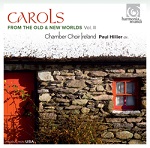
 Carols
from the Old and New Worlds has reached Volume 3: on Harmonia
Mundi HMU807610 the Chamber Choir Ireland with Fergal Caulfield
(organ) are directed by Paul Hillier. The five ‘O’ antiphons for Advent
each introduce a selection of carols from Ireland, the USA, the UK,
and Alpine regions, many in arrangements by Hillier himself. Download
from eclassical.com
(mp3, 16- and 24-bit lossless, with pdf booklet containing texts).
The material, especially as arranged, is mostly little enough known
for it not to seem silly that I had to listen in early November. Performances
are all that you would expect with Hillier at the rostrum.
Carols
from the Old and New Worlds has reached Volume 3: on Harmonia
Mundi HMU807610 the Chamber Choir Ireland with Fergal Caulfield
(organ) are directed by Paul Hillier. The five ‘O’ antiphons for Advent
each introduce a selection of carols from Ireland, the USA, the UK,
and Alpine regions, many in arrangements by Hillier himself. Download
from eclassical.com
(mp3, 16- and 24-bit lossless, with pdf booklet containing texts).
The material, especially as arranged, is mostly little enough known
for it not to seem silly that I had to listen in early November. Performances
are all that you would expect with Hillier at the rostrum.
Meanwhile Volume 1 of this series has been reissued at budget price
on the Harmonia Mundi D’Abord label: HMA1957079, but Volume 2
appears to be currently hors de concours, even as a download.
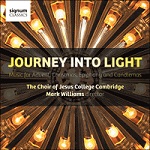
 Journey
into Light contains a programme of music for Advent, Christmas,
Epiphany and Candlemas, performed by the choir of Jesus College, Cambridge/Mark
Williams (Signum SIGCD269 [68:10] – from hyperion-records.co.uk,
mp3, 16- and 24-bit lossless, no booklet). David Dunsmore thought this
‘A very well chosen selection of Christmas Choral music magnificently
sung’ – see review
and full track details.
Journey
into Light contains a programme of music for Advent, Christmas,
Epiphany and Candlemas, performed by the choir of Jesus College, Cambridge/Mark
Williams (Signum SIGCD269 [68:10] – from hyperion-records.co.uk,
mp3, 16- and 24-bit lossless, no booklet). David Dunsmore thought this
‘A very well chosen selection of Christmas Choral music magnificently
sung’ – see review
and full track details.
With the mp3 and 16-bit priced at £7.99 and even the 24-bit at only
£9, this is something of a bargain, too, though that’s slightly offset
by the lack of a booklet – you’ll find one at Naxos
Music Library, whence you can also stream the music.
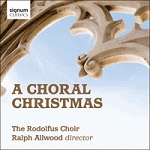
 Also
from Signum, the Rodolfus Choir/Ralph Allwood in a similar collection,
though with very little actual overlap between the two: A Choral
Christmas (SIGCD257 [65:37] – from hyperion-records.co.uk,
mp3, 16- and 24-bit lossless). Once more David Dunsmore was enthusiastic
– review
and details – and again the price is attractive. There’s no booklet
but Naxos
Music Library have it and it can be streamed from there.
Also
from Signum, the Rodolfus Choir/Ralph Allwood in a similar collection,
though with very little actual overlap between the two: A Choral
Christmas (SIGCD257 [65:37] – from hyperion-records.co.uk,
mp3, 16- and 24-bit lossless). Once more David Dunsmore was enthusiastic
– review
and details – and again the price is attractive. There’s no booklet
but Naxos
Music Library have it and it can be streamed from there.
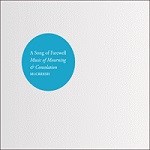 Still
with Signum but varying the season, I have two amendments to make to
the review of A Song of Farewell which I reviewed in August
2012/2 (Signum SIGCD281). Firstly the pdf booklet, the absence
of which I complained of from classisconline.com and Naxos Music Library,
is now provided by both.
Still
with Signum but varying the season, I have two amendments to make to
the review of A Song of Farewell which I reviewed in August
2012/2 (Signum SIGCD281). Firstly the pdf booklet, the absence
of which I complained of from classisconline.com and Naxos Music Library,
is now provided by both.
Secondly, perhaps more importantly for those who insist on the best
sound quality, this recording is now available from hyperion-records.co.uk,
also with the booklet, £7.99 for mp3 and 16-bit lossless, £9 for 24-bit.
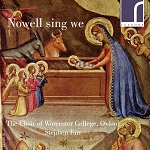
 Nowell
Sing We is Resonus Classics’ second recording of contemporary
Christmas music from Worcester College, Oxford, directed by Stephen
Farr (organ): I thought the first, This Christmas Night, ‘sufficiently
different not to get lost in the welter of seasonal recordings’ (RES10113
– 2012/21)
and the second is just as fine.
Nowell
Sing We is Resonus Classics’ second recording of contemporary
Christmas music from Worcester College, Oxford, directed by Stephen
Farr (organ): I thought the first, This Christmas Night, ‘sufficiently
different not to get lost in the welter of seasonal recordings’ (RES10113
– 2012/21)
and the second is just as fine.
The new recording contains: Gabriel Jackson: Nowell sing we;
Edmund Rubbra: The Virgin’s Cradle Hymn; Lennox Berkeley:
Sweet was the song; Richard Rodney Bennett: Puer Nobis;
John Scott: Nova! nova! Colin Matthews: The Angels’
Carol; Herbert Howells: O mortal man; Peter Maxwell Davies:
Kings and Shepherds; Philip Moore: Lo, that is a marvellous change;
Giles Swayne: O magnum mysterium; Hafliði Hallgrímsson:
Christ was born on Christmas Day; Richard Rodney Bennett: I Saw
Three Ships; Francis Pott: Lute-Book Lullaby; Grayston Ives:
This is the record of John; Richard Lloyd: Drop down, ye heavens;
Michael Finnissy: Ave regina cœlorum; Richard Rodney
Bennett: Nowell, nowell, tidings true and Jamie W. Hall:
As I lay upon a night, with the Advent ‘O’ Antiphon preludes interspersed
throughout. I’m not going to quibble that it’s not all strictly contemporary
– it’s all recent, all enjoyable and all well sung. (RES10138
– from resonusclassics.com,
mp3, aac, 16- and 24-bit flac; pdf booklet with texts available).














